Get Inspired and Motivated with my Engaging Hebrew Content
From Ghostwriting to Hebrew Learning: Your One-Stop Writing Shop
ברוכים הבאים לאתר שלי, המוקדש ברובו לפרסום המאמרים שלי באנגלית ובעברית, והמכסים נושאים שונים כגון פסיכולוגיה, בריאות, אורח חיים, חינוך ועוד הרבה.
כסופר צללים למגוון ז'אנרים של ספרים וככותב תוכן מנוסה לקידום אתרים, אני כאן כדי לעזור לכם בכתיבת כל ספר, כל מאמר, כל חיבור. בין אם אתם זקוקים למאמרים, פוסטים לבלוג או סוגים אחרים של תוכן, אני נלהב לכתוב ומסור לעזור לאחרים. בואו נעבוד יחד כדי ליצור משהו באמת מדהים ומעורר השראה. עם הכישורים שלי בכתיבה וסיפורים, והתשוקה שלי להניע אחרים, אנחנו יכולים לגרום לחזון שלך להתעורר לחיים.
Welcome to my website dedicated to publishing my written articles and publications in both English and Hebrew, covering various topics such as health, lifestyle, education, and more.
As a ghost-writer for a variety of book genres and an experienced SEO content writer, I am here to help you with your writing projects. Whether you need articles, blog posts, or other types of content, I am passionate about writing and dedicated to helping others. Let's work together to create something truly amazing and inspiring. With my skills in writing and storytelling, and my passion for motivating others, we can make your vision come to life.
In addition to language learning materials, you will also find a collection of stories designed to help you practice your Hebrew language skills in a fun and engaging way. These stories are written in both English and Hebrew, accessible to learners of Hebrew language at all levels. The stories and articles cover a variety of genres, including fiction, non-fiction, and poetry, and are updated regularly to provide you with new content to explore.
© Samibsoul.com 2023
Ghost-Writing: Bringing Your Vision to Life with Sami
Welcome to my website dedicated to publishing my written articles and publications in both English and Hebrew, covering various topics such as health, lifestyle, education, and more.
As a Hebrew ghost-writer for a variety of book genres and an experienced SEO content writer, I am here to help you with your writing projects. Whether you need articles, blog posts, or other types of content, I am passionate about writing and dedicated to helping others. Let's work together to create something truly amazing and inspiring. With my skills in writing and storytelling, and my passion for motivating others, we can bring your vision to life.
Mastering the "Tell Me About Yourself" Question in Job Interviews
Mastering the "Tell Me About Yourself" Question in Job Interviews
Part 5
By Sami Bsoul
I know it is hard for me to predict who you, my mysterious reader, are, but it is not hard for me to tell you that if this is the first question you are asked, then the ball is now in your court. This is a typical question that is frequently repeated in interviews. Your answer will depend on various factors, but you are the one who knows yourself best.
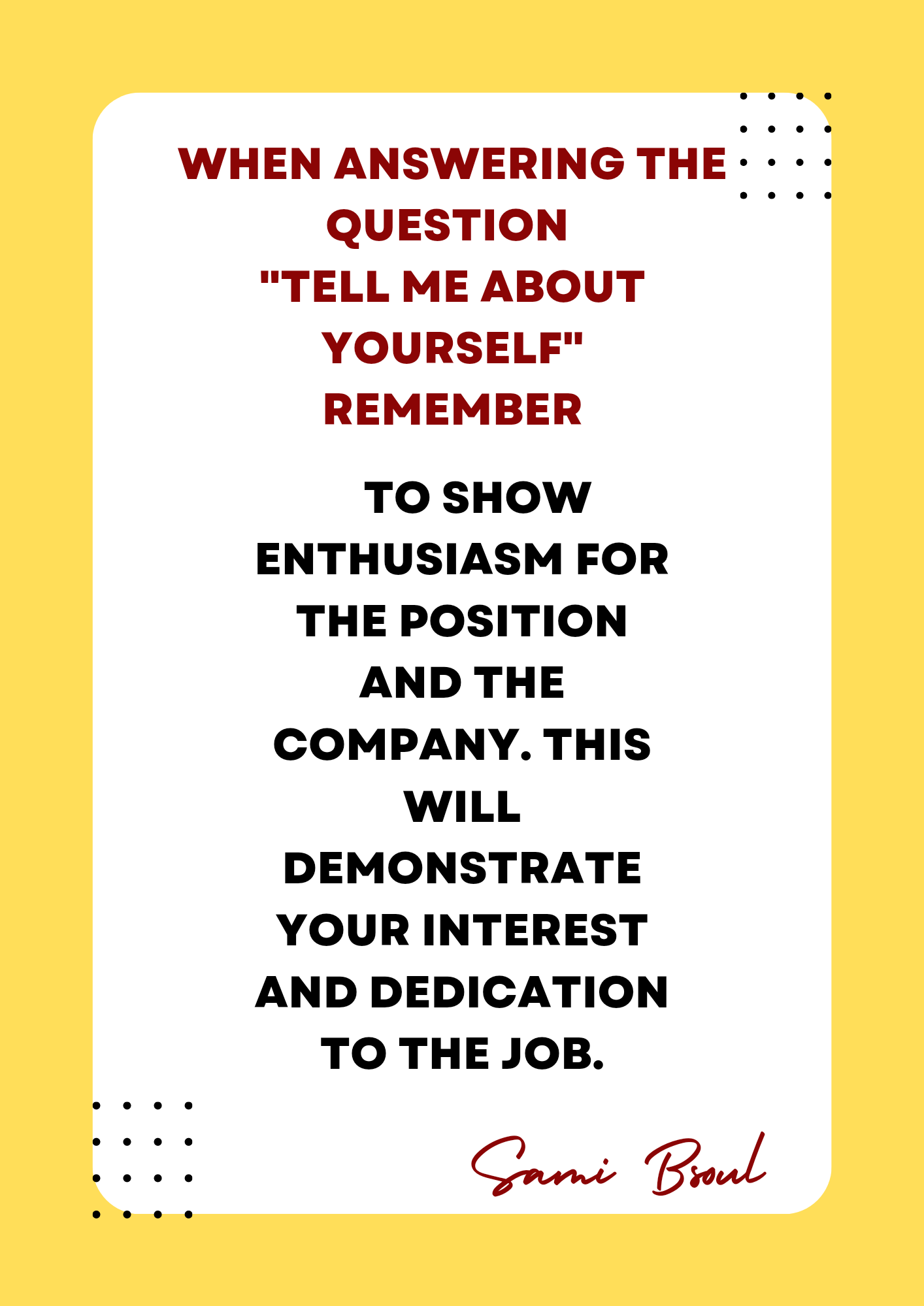
Start with your latest/current role. You do not need to mention what you did last summer during your vacation since your interviewer
or future employer already has your resume. During these few moments, be brief, clear, and show them who you really are. This is your chance to be unique and mention something new about yourself that you would like your future employer to know.
Example
If you are currently employed in another company and doing a similar job to the one you applied for, briefly mention what you do at your current company. However, keep in mind that your answer should not contain any confidential information from your current or previous jobs, and you should be fully honest.
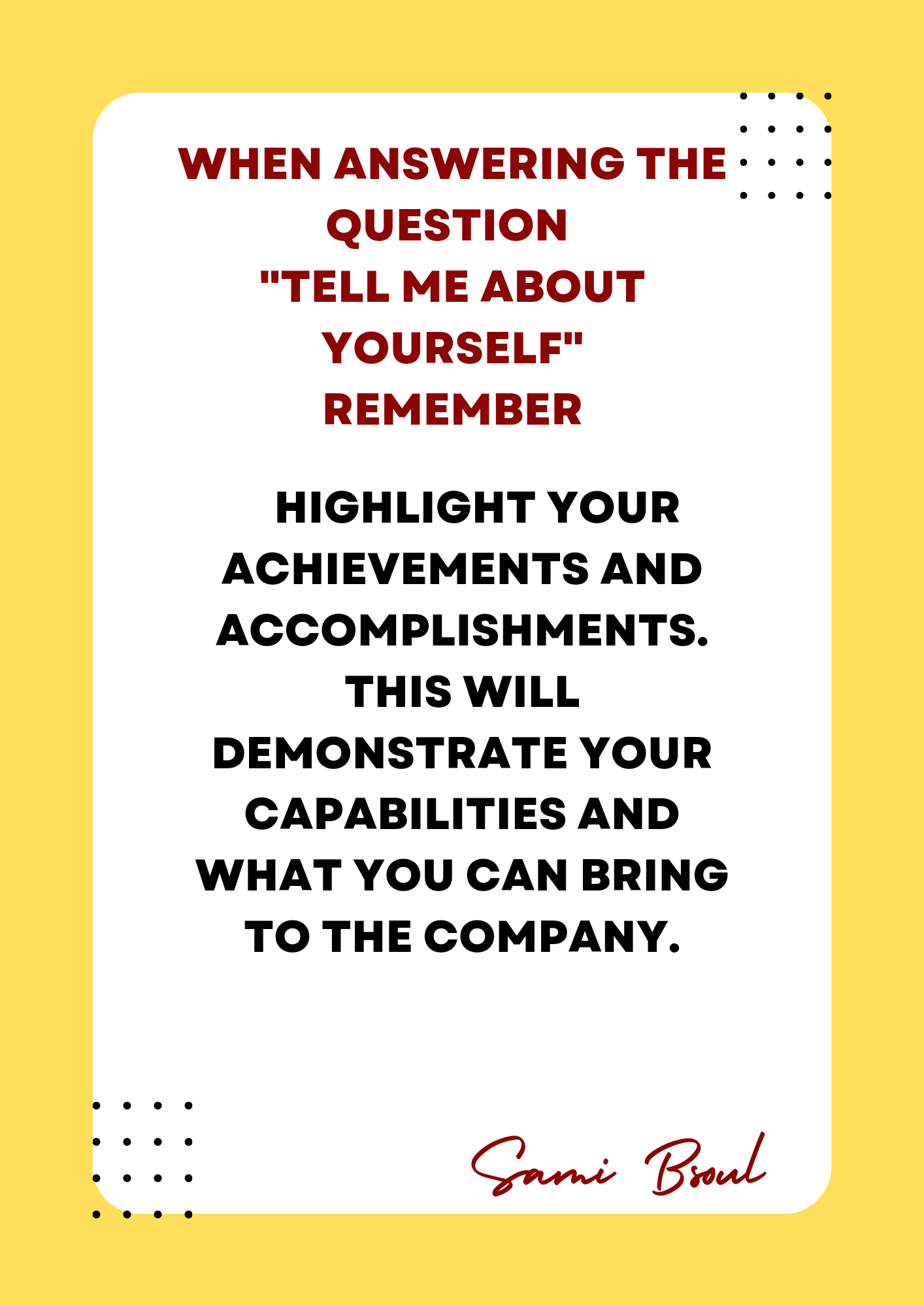
If you feel uncomfortable answering the question, especially if you are currently unemployed or have been for some time, don't worry. You can talk about your latest relevant job/s, being specific about the tasks and responsibilities that relate to the position you are applying for now.
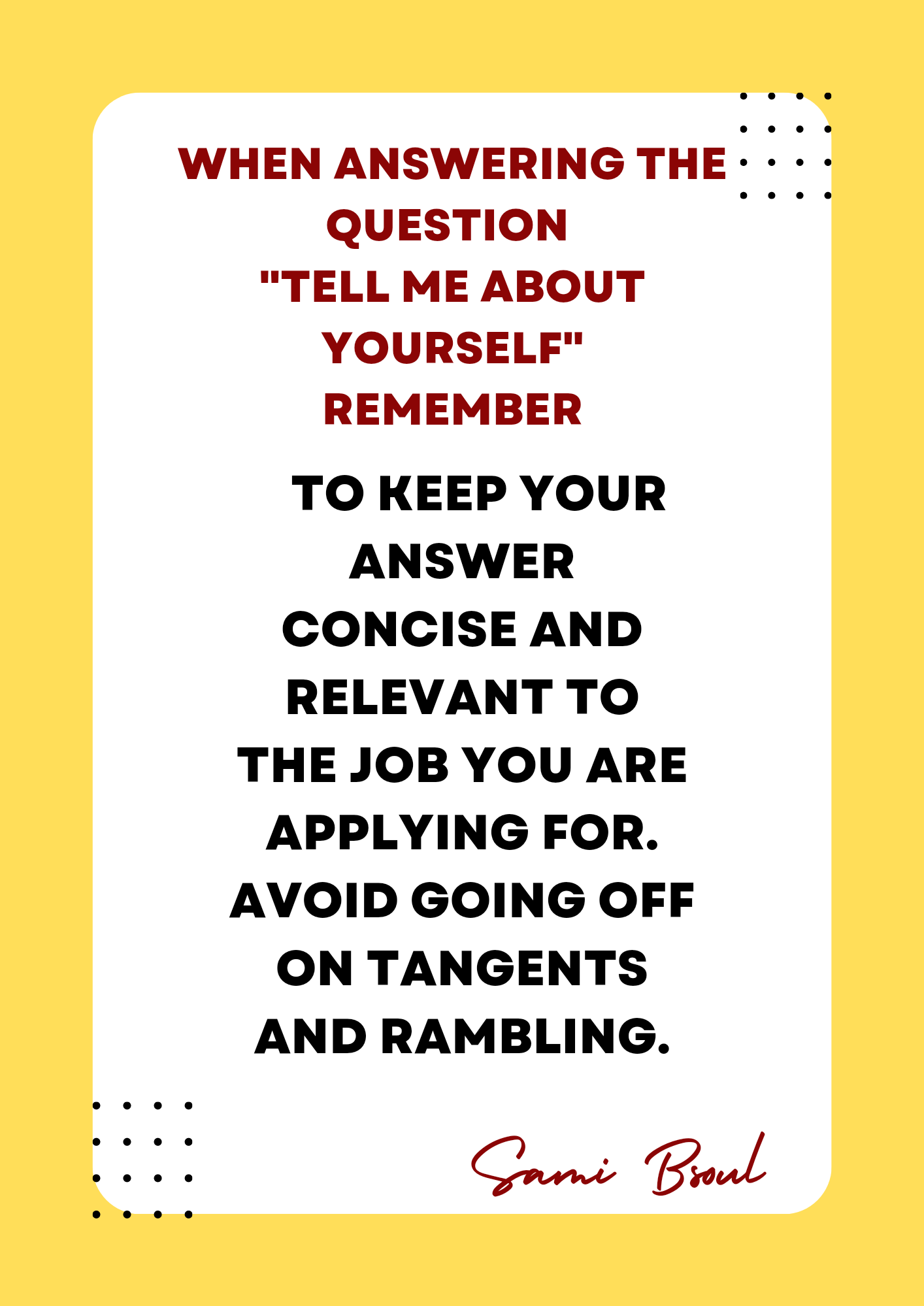
If the question is relevant to your current employment status, you can answer accordingly. For example, if you are currently employed, your answer might be: "I am currently working as (mention your position)."
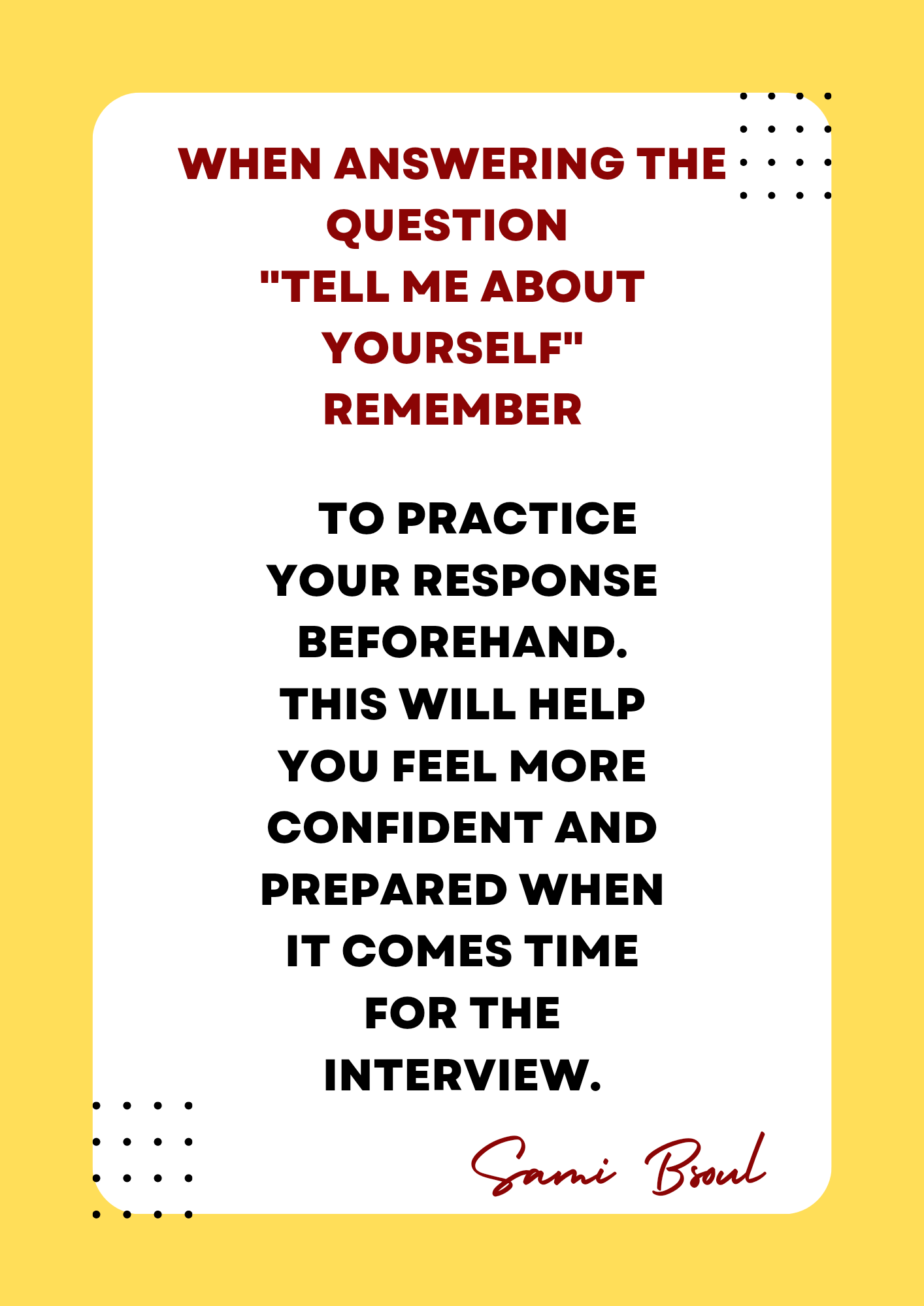
If you are currently unemployed, your answer could be: "My most recent job role was (mention your position), and I resigned from that position." Then, you can mention what you have been doing in the meantime to show that you have been productive and proactive. Your interviewer is not expecting you to be unemployed for an extended period, so it's essential to be honest about what you have been doing since your previous job. Avoid giving the impression that you have been sitting at home doing nothing.
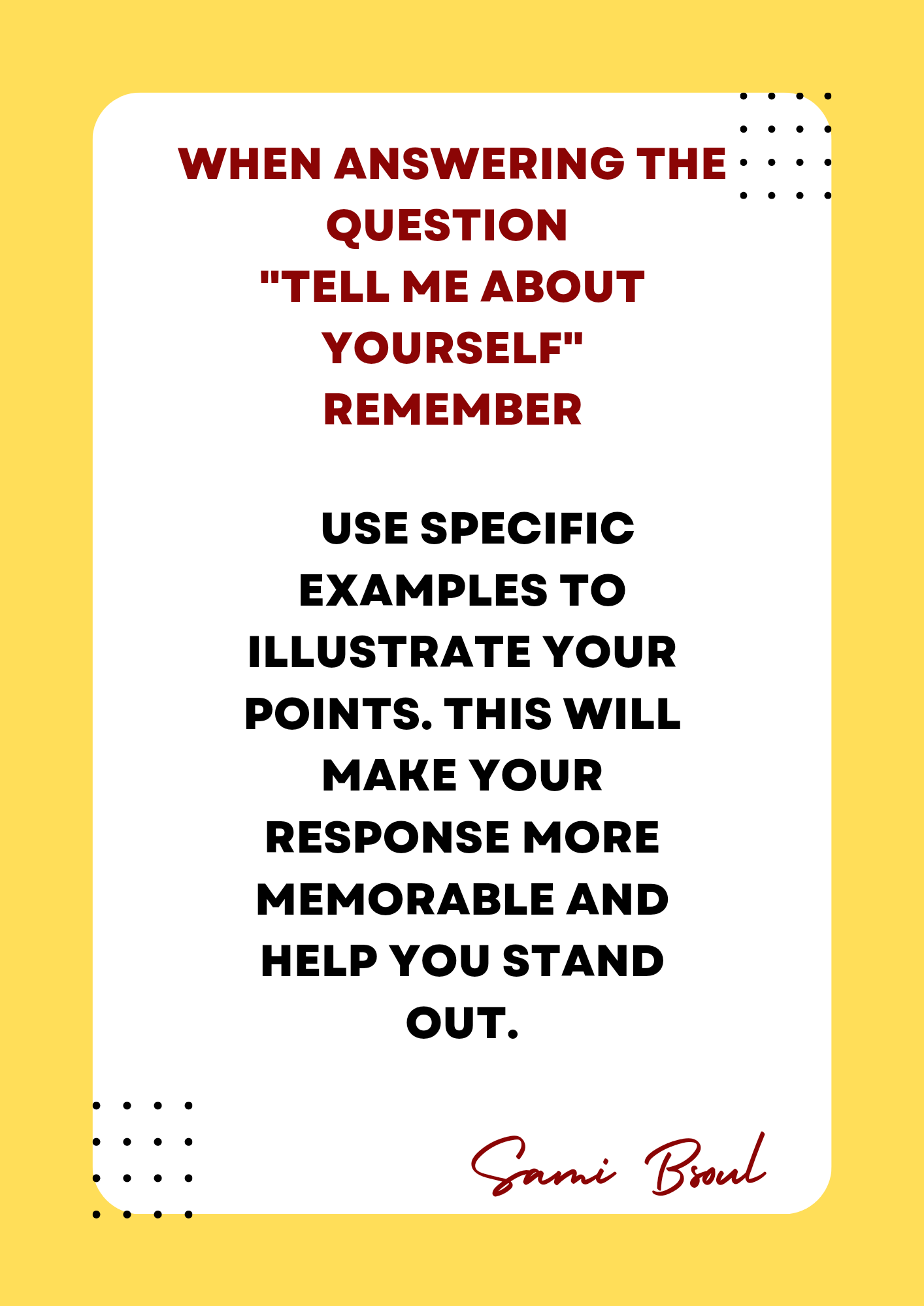
You could say, "I have been working on my personal development and recently completed a new degree (or some other educational program)." This will show that you have been productive and proactive, even if you haven't been working. You could also mention any other accomplishments or projects that you have been working on.
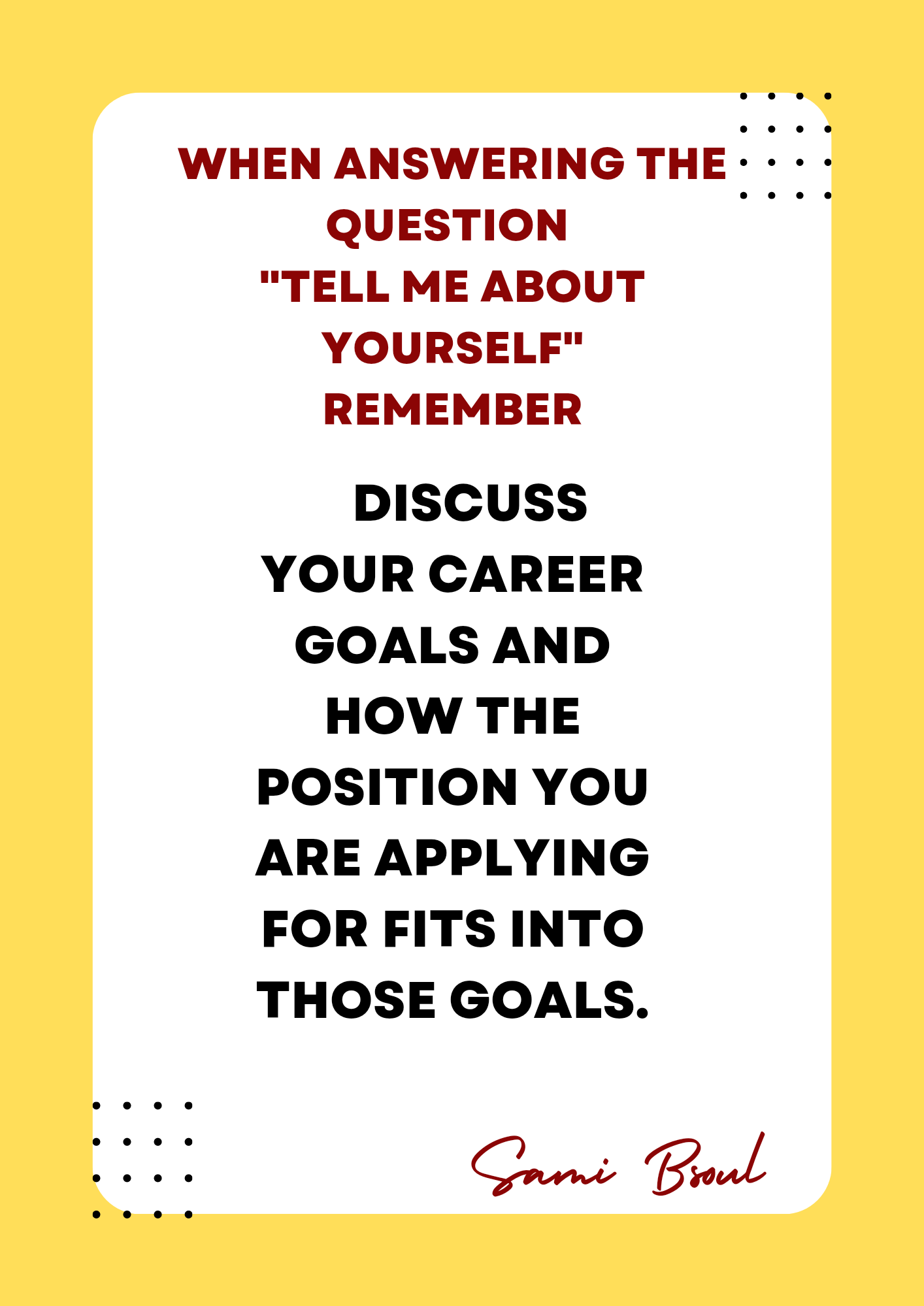
It's essential to highlight the positive things you have been doing lately, even if you haven't been employed. Your interviewer wants to know that you are a productive and motivated person. You can then continue by giving a brief background about yourself, focusing on your relevant skills and experience that make you the ideal candidate for the position.
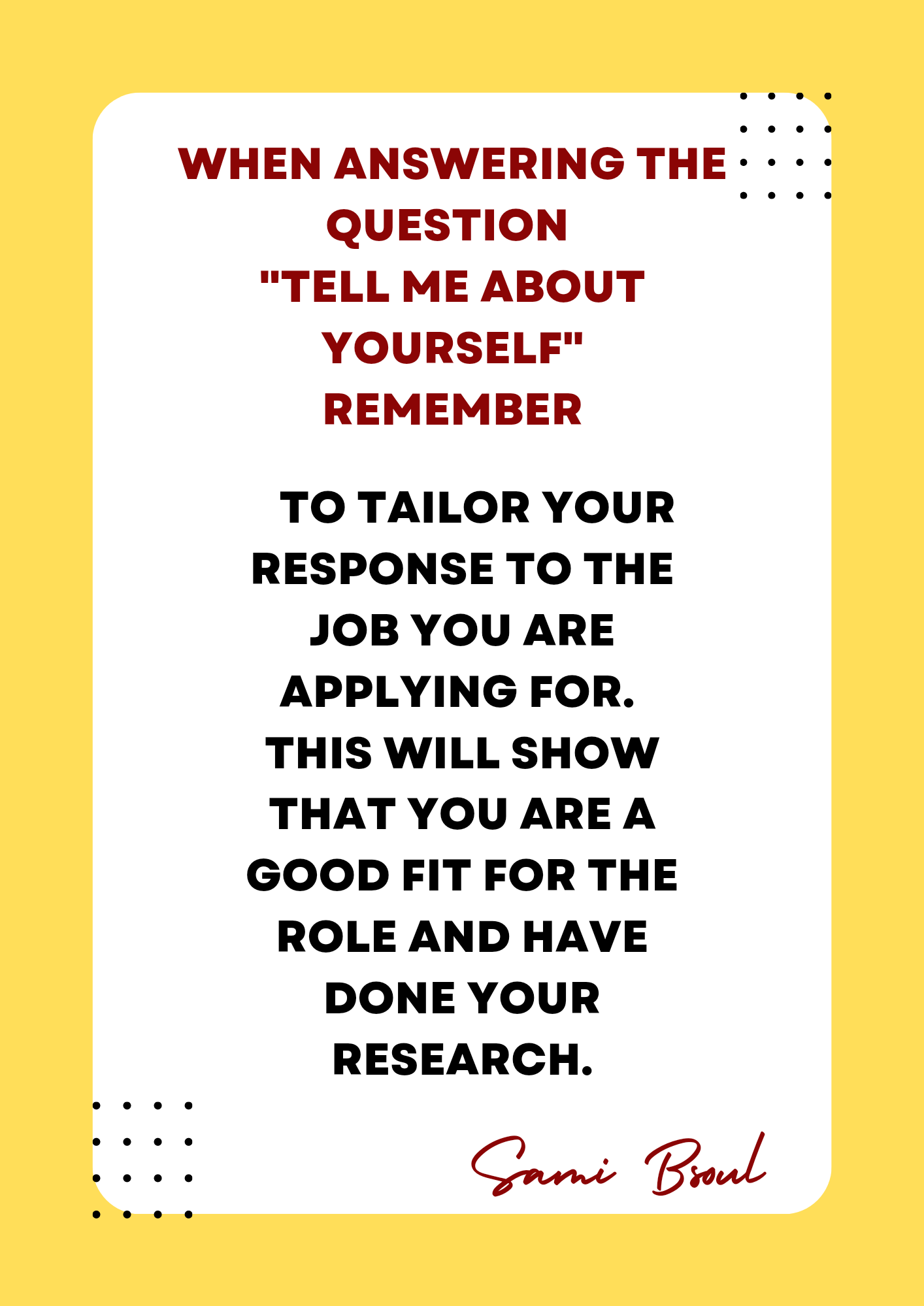
"My most recent job in the last few years/months was (mention your position). I started as (mention your best work experience that is relevant to the job you are currently applying for), as I knew this would be my career path and what I wanted to do most. Soon, I developed skills that enabled me to take on the role of (mention the second role) within the same department. Every year, I progressed to a higher level by taking on new roles, responsibilities, and challenges within the business area (mention the department or division). My latest role was (briefly mention it)."
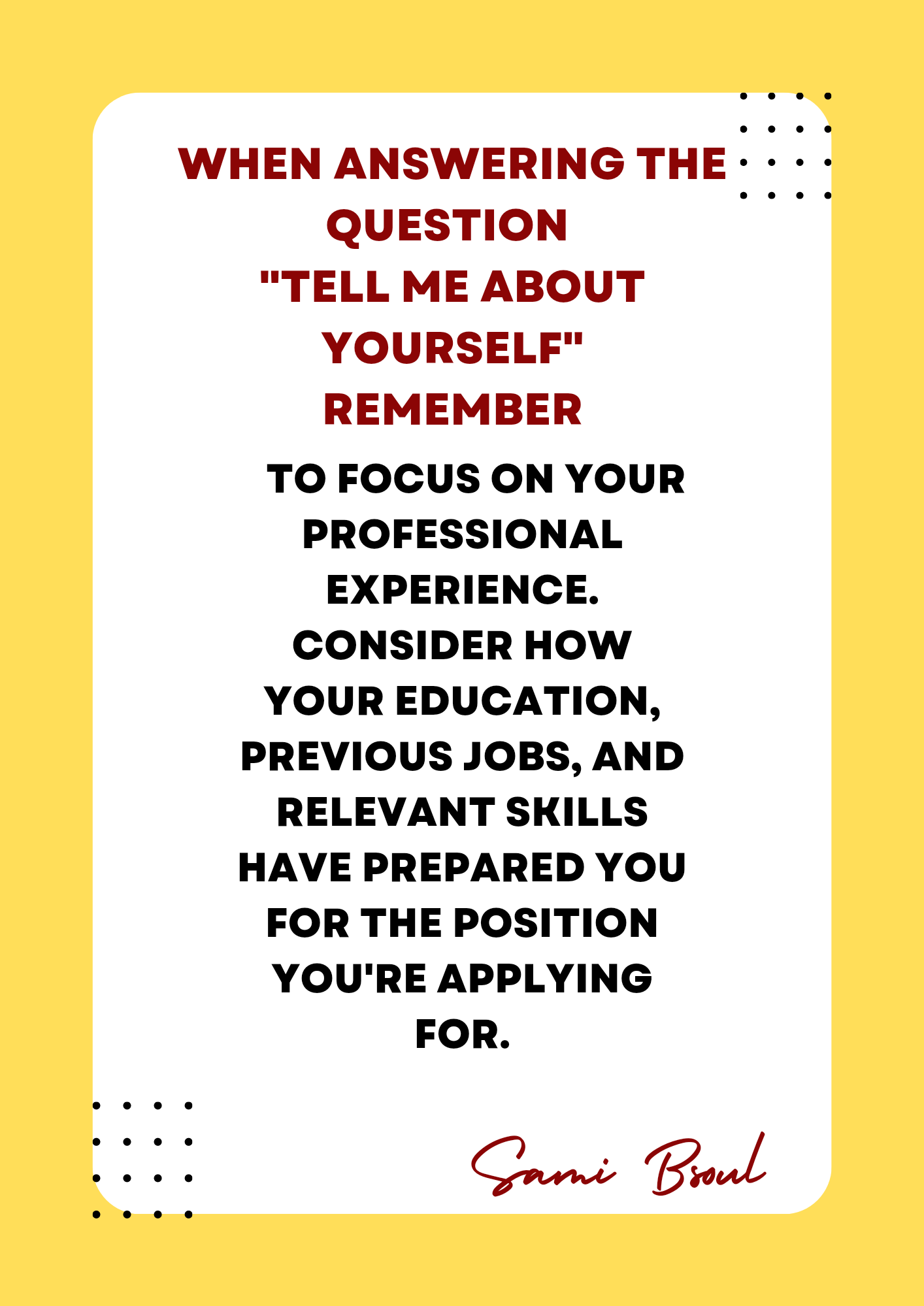
This response shows that you have a clear career path and have been able to progress and develop new skills throughout your career. It also highlights your relevant experience and shows that you are a motivated and driven individual.
"If you want to showcase your uniqueness, you can mention that, in addition to understanding the processes flow (which should be relevant to the job you are applying for), you have also learned what works and what doesn't work. For example, you may have discovered mistakes in a particular process. No matter what job you do, you will inevitably learn what works and what doesn't. In a way, this is what is called 'risk assessment', and it can be a significant advantage."
This response highlights your ability to identify and analyse problems and shows that you are a valuable asset to any team. It also demonstrates your attention to detail and commitment to improving processes.
Other relevant examples you may use, include:
Instead of saying "I had a team under my responsibility," you could say "I had the opportunity to demonstrate my leadership skills by managing a team of [insert number of employees here]."
Instead of saying "I was involved in change management," you could say "I performed change management activities."
Instead of saying "I was responsible for implementing improvements," you could say "I implemented improvements in [insert area of responsibility here]."
Remember, in any matter, you do not want to come across as arrogant. You want to feel proud, and that can make a big difference. When it comes to your future employer or interviewers, they will see that you are well-prepared with a good CV, have defined your goals, and gained the skills required to achieve them. Here's some advice on the question "Tell me about yourself": be brief when answering. The interview has just started, but that doesn't mean you should only say one word and wait for the next question to be asked. Rather, you should find a balance between being talkative on some questions and not on others. You should be comfortable with each question and to some degree, the length of your answers. Keep your responses neither too long nor too short.
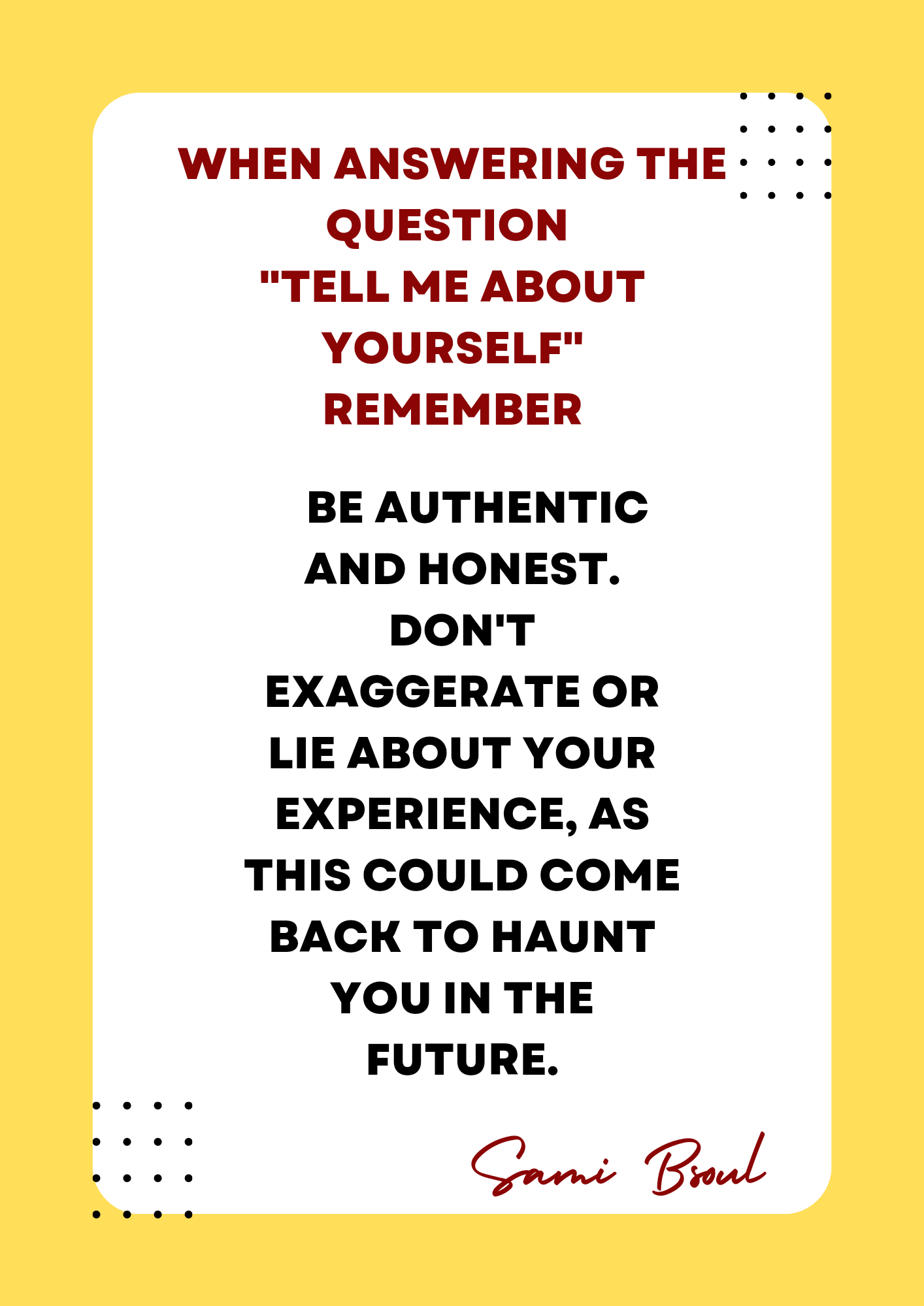
Note 1: If you were to ask me what I consider more important - skills or passion - I would say passion, without hesitation. If it is possible for you, please do not apply for any job that you do not like. Instead, dare to apply for a job you like or would like to do, even if you do not have all the required skills for it. But please do not apply for a surgical role at a hospital or clinic and then tell me you have a passion to be a doctor, only to be rejected because it was found out that you have never graduated from medical school.
When answering the question "tell me about yourself"
Remember
- Keep it brief and to the point. Avoid rambling and getting sidetracked.
When answering the question "tell me about yourself,"Keep it brief and to the point. Avoid rambling and getting sidetracked.
When answering the question "tell me about yourself," remember to keep your answer brief and to the point. Avoid going off on tangents and rambling, as this can make your answer less effective and memorable.
- Highlight your relevant skills and experience.
Focus on highlighting your relevant skills and experience when answering this question. Consider how your past experiences have prepared you for the position you're applying for.
- Tailor your response to the position and company.
Tailor your response to the position and company you're applying to. Highlight skills and experiences that are relevant to the specific job requirements and company culture.
- Emphasize your achievements and accomplishments.
Emphasize your achievements and accomplishments when answering this question. This will help demonstrate your value and potential contribution to the company.
- Use concrete examples to illustrate your points.
When answering the question "tell me about yourself," use concrete examples to illustrate your points. This will help make your response more engaging and memorable.
- Be confident and positive in your delivery.
When delivering your response, be confident and positive. This will help demonstrate your enthusiasm and readiness for the position.
- Avoid personal information that isn't relevant to the job.
Avoid including personal information that isn't relevant to the job when answering this question. Stick to professional information that highlights your qualifications for the position.
- Be aware of your body language and tone of voice.
Be aware of your body language and tone of voice when answering this question. Maintain eye contact, speak clearly and confidently, and avoid fidgeting or slouching.
- Practice your response beforehand.
Practice your response to this question beforehand to help ensure that you're delivering a clear and effective message.
- End on a positive note and express your interest in the position.
End your response on a positive note and express your interest in the position. This will help demonstrate your enthusiasm for the job and leave a lasting impression on the interviewer. remember to keep your answer brief and to the point. Avoid going off on tangents and rambling, as this can make your answer less effective and memorable.
Continue reading here - Why do you want to work here/for us?
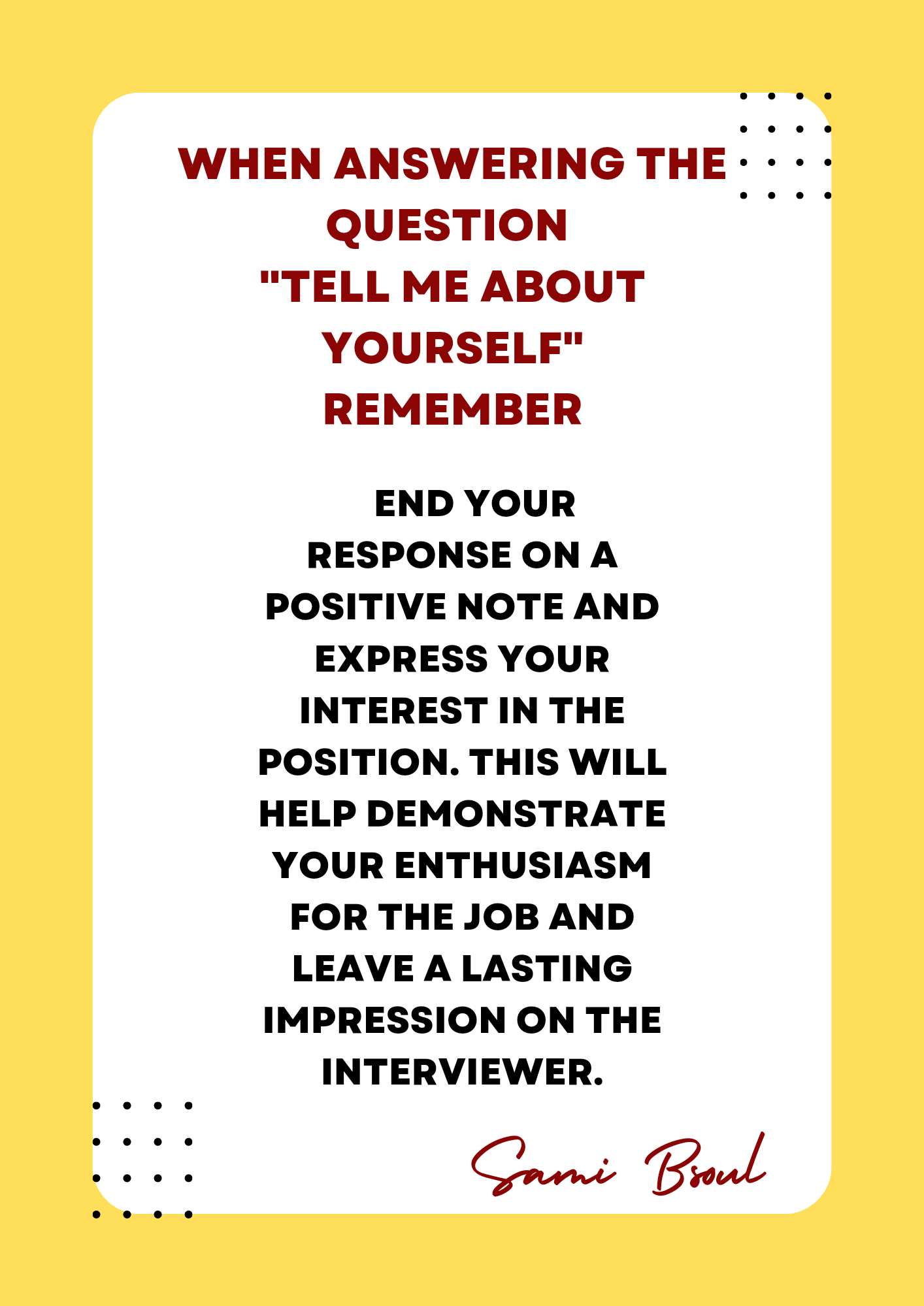

פינת הסיפורים
רגשות וחוויות
מאת סאמי בסול
בְּאֶרֶץ הָרְגָשׁוֹת וְהַחֲוָיוֹת, בְּתוֹךְ גַּן בַּעַל מַרְאֶה מַדְהִים בְּיוֹתֵר, אַתֶּם לֹא יְכוֹלִים לְדַמְיֵן לְעַצְמְכֶם כַּמָּה הוּא יָפֶה, מָלֵא בִּפְרָחִים תּוֹסְסִים וְצִבְעוֹנִיִּים, חַיָּה לָהּ בְּהַרְמוֹנְיָה מֻשְׁלֶמֶת מִשְׁפָּחָה גְּדוֹלָה שֶׁל רְגָשׁוֹת.
שָׁם חָיוּ אַהֲבָה, אֱמוּנָה, רֹגַע וְשַׁלְוָה, הֲבָנָה, תִּקְוָה, אֹשֶׁר, שִׂמְחָה, תַּאֲוָה, וְגַם שִׂנְאָה.
הָרְגָשׁוֹת הָיוּ כָּל כָּךְ שׁוֹנִים זֶה מִזֶּה, אֲבָל הֵם הִסְתַּדְּרוּ בֵּינֵיהֶם לֹא רַע, כִּי כָּל רֶגֶשׁ יָדַע אֶת מְקוֹמוֹ וְאֶת עִרְכוּ.
הֵם הָיוּ מְאוֹד קְרוֹבִים זֶה לָזֶה וְאָהֲבוּ לְבַלּוֹת יַחַד, כִּי הֵם הֵבִינוּ וְהַשְׁלִימוּ עִם מַעֲמָדָם וְתַפְקִידָם, אֲבָל הֵם הוֹצִיאוּ אֶת שִׂנְאָה מִחוּץ לַמַּעְגָּל שֶׁלָּהֶם לְגַמְרֵי. לָכֵן שִׂנְאָה תִּעֲבָה אֶת כֻּלָּם תִּעוּב בִּלְתִּי סָבִיר.
שִׂנְאָה הִתְחִילָה לְהִתְפַּשֵּׁט כְּמוֹ מַחֲלָה, וְהִדְבִּיקָה אֶת הַלֵּב וְהַמֹּחַ שֶׁל אֲנָשִׁים בְּכָל הָעוֹלָם. זֶה הִתְחִיל בְּקָטָן עִם יְחִידִים שֶׁנָּשְׁאוּ טִינָה, אֲבָל עַד מְהֵרָה הַשִּׂנְאָה גָּדְלָה לְכוֹחַ עָצוּם שֶׁאִיֵּם לַהֲרֹס כָּל מָה שֶׁנִּקְרָה בְּדַרְכָּהּ. כְּשֶׁהַשִּׂנְאָה הִתְחַזְּקָה, הִיא הִתְחִילָה לְהִשְׁתַּלֵּט עַל מַעֲשֵׂיהֶם וְהַחְלָטוֹתֵיהֶם שֶׁל יוֹתֵר אֲנָשִׁים. הִיא גָּרְמָה לִיחִידִים וּלְאֻמּוֹת לְהִתְהַפֵּךְ אֵלֶּה עַל אֵלֶּה, אֲנָשִׁים הִתְחִילוּ לִרְאוֹת אֶת חַבְרֵיהֶם כְּאוֹיְבִים וְלֹא כְּבַעֲלֵי בְּרִית.
כְּכָל שֶׁכּוֹחָהּ שֶׁל הַשִּׂנְאָה הִמְשִׁיךְ לִגְדֹּל, הִיא הָפְכָה לְהַרְסָנִית יוֹתֵר וְיוֹתֵר. עַד שֶׁיּוֹם אֶחָד שִׂנְאָה הִשְׁתַּלְּטָה עַל הַמַּצָּב, וְהִתְחִילָה לְסַכְסֵךְ בֵּין כָּל הָרְגָשׁוֹת. הִיא נִגְּשָׁה לְכָל רֶגֶשׁ וְלָחֲשָׁה בְּאָזְנוֹ, לֹא פָּחוֹת מֵאֲשֶׁר דִּבְרֵי טִינָה. הַדְּבָרִים שֶׁל שִׂנְאָה, כָּלְלוּ גַּם שְׁקָרִים בּוֹטִים.
שִׂנְאָה הֶחֱלִיטָה לְהַתְחִיל לְהַחְלִישׁ קֹדֶם אֶת אַהֲבָה. אָז שִׂנְאָה בָּאָה עֲטוּפָה בְּעַרְמוּמִיּוּת וְאָמְרָה לְאַהֲבָה "אֱמוּנָה לֹא מְכַבֶּדֶת אוֹתָךְ, וְהִיא טוֹעֶנֶת שֶׁהִיא יוֹתֵר חֲשׁוּבָה מִמֵּךְ."
אוֹתוֹ דָּבָר, שִׂנְאָה לָחֲשָׁה לֶאֱמוּנָה בָּאֹזֶן וְאָמְרָה לָהּ
"תִּקְוָה מְזַלְזֶלֶת בָּךְ, וְהִיא תִּקְוָה אוֹמֶרֶת עַל עַצְמָהּ, שֶׁהִיא חֲשׁוּבָה יוֹתֵר מִמֵּךְ."
כָּךְ שִׂנְאָה עָבְרָה בֵּין הָרְגָשׁוֹת, וְלָחֲשָׁה בְּאָזְנוֹ שֶׁל כָּל רֶגֶשׁ. הִיא לָחֲשָׁה בְּאָזְנָהּ שֶׁל תִּקְוָה, בְּאָזְנוֹ שֶׁל אֹשֶׁר, בְּאָזְנֵיהֶם שֶׁל רֹגַע וְשַׁלְוָה, וְשֶׁל תַּאֲוָה. שִׂנְאָה גַּם לֹא שָׁכְחָה לִלְחֹשׁ דְּבָרִים דּוֹמִים בְּאָזְנָהּ שֶׁל שִׂמְחָה.
הִיא גַּם נִסְּתָה לִלְחֹשׁ בְּאָזְנֶיהָ שֶׁל הֲבָנָה, אֲבָל הִיא לֹא הִצְלִיחָה, כִּי הֲבָנָה חָסְמָה אֶת שִׂנְאָה עַל הַסַּף.
בְּעִקְבוֹת הַשֶּׁקֶר הַנִּתְעָב שֶׁל שִׂנְאָה, כָּל הָרְגָשׁוֹת הִתְאַסְּפוּ וְנִקְלְעוּ לְוִכּוּחַ סוֹעֵר עַל מִי הָיָה הֶחָשׁוּב בְּיוֹתֵר מִבֵּינֵיהֶם.
אַהֲבָה דִּבְּרָה תְּחִלָּה
"אֲנִי אַהֲבָה, אֲנִי הַכּוֹחַ שֶׁמְּחַבֵּר אֶת הַיְּקוּם, לַמְרוֹת שֶׁזֶּה לֹא תָּמִיד קַל לְהָבִין אוֹתִי. יֵשׁ אֲנָשִׁים שֶׁרוֹאִים בִּי כִּתְחוּשָׁה חֲמִימָה בַּלֵּב, אוֹ תְּחוּשַׁת פַּרְפָּרִים בַּבֶּטֶן. אֲנִי לֹא רַק רוֹמַנְטִיקָה, אֲנִי הַרְבֵּה יוֹתֵר מזֶה. אֲנִי הָאִמָּא שֶׁמְּחַבֶּקֶת אֶת יְלָדֶיהָ, אֲנִי הָאַבָּא שֶׁמְּלַמֵּד אֶת בְּנוֹ לִרְכֹּב עַל אוֹפַנַּיִם. אֲנִי הַמּוֹרֶה שֶׁנּוֹתֵן הַשְׁרָאָה לְתַלְמִידָיו, אֲנִי הֶחָבֵר שֶׁמַּקְשִׁיב לְלֹא שִׁפּוּט, אֲנִי הַזָּר שֶׁמּוֹשִׁיט יָד לְעֶזְרָה, אֲנִי הַחַיָּל שֶׁנִּלְחַם לְמַעַן אַרְצוֹ. נָכוֹן, אֲנִי לֹא תָּמִיד עֲדִינָה. לִפְעָמִים אֲנִי גַּסָּה, לִפְעָמִים אֲנִי תּוֹבְעָנִית, לִפְעָמִים אֲנִי דּוֹחֶפֶת אֲנָשִׁים לָצֵאת מאיזוֹר הַנּוֹחוּת שֶׁלָּהֶם אֶל חֲוָיוֹת חֲדָשׁוֹת. נוּּ, וְלִפְעָמִים אֲנִי אַכְזָרִית, גּוֹרֶמֶת לְשִׁבְרוֹן לֵב וּכְאֵב. אֲבָל גַּם בָּרְגָעִים הֲכִי אֲפֵלִים שֶׁלִּי, אֲנִי עֲדַיִן אַהֲבָה. אֲנִי הַכּוֹחַ שֶׁמַּפְגִּישׁ בֵּין אֲנָשִׁים, אֲנִי הַכּוֹחַ שֶׁעוֹזֵר לָהֶם לְרַפֵּא וְלִצְמֹחַ. אֲנִי הַסִּבָּה שֶׁבִּגְלָלָהּ שָׁוֶה לִחְיוֹת אֶת הַחַיִּים, אֲנִי הוּא הַדָּבָר שֶׁהוֹפֵךְ אֶת כֻּלָּם לֶאֱנוֹשִׁיִּים.
אֲנִי לֹא סְתָם תְּחוּשָׁה אוֹ רֶגֶשׁ. אֲנִי כּוֹחַ שֶׁמְּעַצֵּב אֶת הָעוֹלָם מִסָּבִיב. אֲנִי חֲשׁוּבָה יוֹתֵר מִכֻּלְּכֶם. בִּלְעָדַי, הַחַיִּים יִהְיוּ חַסְרֵי מַשְׁמָעוּת, וַאֲנִי הַדָּבָר הַיָּחִיד שֶׁיָּכוֹל לִכְבֹּשׁ שִׂנְאָה..".
אֱמוּנָה לֹא הֶאֱמִינָה לְמִשְׁמַע אָזְנֶיהָ, וְקָטְעָה אֶת הַדְּבָרִים שֶׁל אַהֲבָה
"בֶּאֱמֶת?! אֲהוּבָתִי הַיְּקָרָה, אִם אֶת הַיְּחִידָה שֶׁיְּכוֹלָה לְנַצֵּחַ שִׂנְאָה, אָז לָמָּה נָתַתְּ לָהּ לְהַשְׁפִּיעַ עָלַיִךְ? לָמָּה לֹא עָצַרְתְּ אוֹתָהּ כְּשֶׁהִיא הִתְחִילָה לְסַכְסֵךְ בֵּינֵינוּ? אֲנִי לֹא מַסְכִּימָה אִתָּךְ. בִּלְעָדַי, אֵין תִּקְוָה. אֲנִי אֱמוּנָה, אֲנִי מַחֲזִיקָה אֶת כֻּלָּם כְּשֶׁהַחַיִּים נִהְיִים קָשִׁים. אֲנִי נוֹתֶנֶת לְכֻלָּם אֶת הַכּוֹחַ לְהִתְגַּבֵּר עַל הַפְּחָדִים, וַאֲנִי הַיְּחִידָה שֶׁנּוֹתֶנֶת אֶת הָאֹמֶץ לְהִתְמוֹדֵד עִם הָאֶתְגָּרִים. אֲנִי כּוֹחַ חָזָק, הַמְּסֻגָּל לְהָזִיז הָרִים וּלְהַשִּׂיג דְּבָרִים גְּדוֹלִים. אֲנִי תָּמִיד נִמְצֵאת שָׁם בִּשְׁבִיל הַנִּזְקָקִים כְּדֵי לְעוֹרֵר וּלְרוֹמֵם אוֹתָם, הַנּוֹכְחוּת שֶׁלִּי בְּחַיֵּיהֶם שֶׁל אֲנָשִׁים עוֹשָׂה הֶבְדֵּל עָצוּם. אֲנִי החֵלֶק החִיּוּנִי בְּיוֹתֵר בְּכָל חֲוָיָה אֱנוֹשִׁית."
בֵּינְתַיִם, רֹגַע וְשַׁלְוָה יָשְׁבוּ לָהֶם בְּנַחַת בַּצַּד עַל הַסַּפְסָל בַּגַּן, וְהִתְבּוֹנַנּוּ בְּכֻלָּם, בְּלִי לוֹמַר כְּלוּם.
גַּם הֲבָנָה עָמְדָה בַּצַּד וְחִיְּכָה לָהּ, אֲבָל הִיא מִדֵּי פַּעַם אָמְרָה מַשֶּׁהוּ בַּאֲדִיבוּת "כֻּלְּכֶם יוֹדְעִים, שֶׁאֲנִי הֲבָנָה, יֵשׁ לִי כּוֹחַ עָצוּם, אֲבָל אֲנִי לֹא מוּכָנָה לִכְפּוֹת אֶת עַצְמִי עֲלֵיכֶם. אֲנִי גַּם לֹא רוֹצָה לִכְפּוֹת מַשֶּׁהוּ עַל אַף אֶחָד. אֲנִי לֹא מוּכָנָה לְהִשְׁתַּלֵּט עַל מוֹחֲכֶם וְלִבְּכֶם עַל מְנַת שֶׁתָּבִינוּ. אֲנִי בָּאָה לִקְרַאת אֵלֶּה שֶׁמּוּכָנִים לְהָבִין."
תִּקְוָה עָמְדָה לָהּ בָּאֶמְצַע, אֲבָל הִיא לֹא יָכְלָה לְהִתְאַפֵּק יוֹתֵר, אָז פָּנְתָה לֶאֱמוּנָה וְאָמְרָה
"אֲבָל מָה אִתִּי? אֲנִי תִּקְוָה, אֲנִי נִמְצֵאת שָׁם בִּשְׁבִיל כֻּלָּם בָּרְגָעִים הֲכִי אֲפֵלִים שֶׁלָּהֶם. אֲנִי הָאוֹר הַמַּנְחֶה אֲנָשִׁים בְּעִצּוּמוֹ שֶׁל הַיֵּאוּשׁ. אֲנִי מִגְדַּלּוֹר הָאוֹפְּטִימִיּוּת כְּשֶׁהַכֹּל נִרְאֶה אָבוּד. אֲנִי נוֹתֶנֶת כּוֹחַ לַאֲנָשִׁים לְהַמְשִׁיךְ. אֲנִי נוֹתֶנֶת כּוֹחַ לַאֲנָשִׁים לְהַאֲמִין בְּעַצְמָם, אֲנִי נוֹתֶנֶת לָאֲנָשִׁים כּוֹחַ לְהַאֲמִין שֶׁמָּחָר יִהְיֶה טוֹב יוֹתֵר. אֲנִי בִּלְתִּי מִנּוֹצַחַת. אֲנִי מָקוֹר כּוֹחַ וְהַשְׁרָאָה לַאֲחֵרִים. בִּלְעָדַי, אַף אֶחָד לֹא יוּכַל לִחְיוֹת חַיִּים נוֹחִים. אֲנִי הַמַּפְתֵּחַ לְאֹשֶׁר וְהַצְלָחָה. אוּלַי אַתֶּם כֻּלְּכֶם מְבִיאִים דְּבָרִים חֲשׁוּבִים לַשֻּׁלְחָן, אֲבָל אֲנִי מַאֲמִינָה, שֶׁאֲנִי הַטּוֹבָה בְּיוֹתֵר מִבֵּינֵינוּ. אֲנִי הִיא שֶׁמַּחֲזִיקָה אֶת כֻּלָּם וּמַזְכִּירָה לָנוּ לִהְיוֹת אֲסִירֵי תּוֹדָה עַל כָּל הַבְּרָכוֹת שֶׁיֵּשׁ לָנוּ בְּחַיֵּינוּ".
אֹשֶׁר, שֶׁתָּמִיד הָיָה עַלִּיז וְאוֹפְּטִימִי, קָם וְטָעַן תּוֹךְ שֶׁהוּא מְחַיֵּךְ
"אֲנִי אֹשֶׁר, אֲנִי מֵפִיץ שִׂמְחָה וְחִיּוּבִיּוּת בְּכָל מָקוֹם אֵלָיו אֲנִי הוֹלֵךְ. אוּלַי אַתֶּם לֹא יוֹדְעִים, אֲבָל הָאוֹפְּטִימִיּוּת שֶׁלִּי הִיא הַכּוֹחַ הַגָּדוֹל בְּיוֹתֵר שֶׁלִּי. אֲנִי לֹא מִסְּבַךְ דְּבָרִים, אֲנִי גּוֹרֵם לַאֲנָשִׁים לִהְיוֹת אֲסִירֵי תּוֹדָה עַל כָּל רֶגַע בּוֹ הֵם זוֹכִים לַחֲווֹת חֲוָיָה טוֹבָה.
אֲנִי הַסִּבָּה שֶׁאֲנָשִׁים מַאֲמִינִים שֶׁהַחַיִּים הֵם מַתָּנָה. אֲנִי גּוֹרֵם לַאֲנָשִׁים לְהִתְמַקֵּד בַּדְּבָרִים הַטּוֹבִים וּבְהִזְדַּמְּנוּיוֹת הַצְּמִיחָה הַנִּלְווֹת אֲלֵיהֶם. אֲנִי נִמְצָא בְּמִלָּה טוֹבָה, אֲנִי נִמְצָא בְּחִיּוּךְ פָּשׁוּט, אֲנִי נִמְצָא בְּכָל רֶגַע כְּדֵי לָתֵת לָאֲנָשִׁים סִבָּה לִשְׂמֹחַ. אֲנִי הוּא זֶה שֶׁעוֹזֵר לַאֲנָשִׁים לִמְצֹא אֶת הַשִּׂמְחָה. בִּלְעָדַי, הַחַיִּים יִהְיוּ רְדוּדִים."
שִׂמְחָה הִתְבּוֹנְנָה בְּכֻלָּם, וְהֵגִיבָה בְּשִׂיא הַסִּפּוּק הָעַצְמִי,
"אוּלַי אֲנַחְנוּ כָּל כָּךְ קְרוֹבִים, אֲבָל אֲנִי שִׂמְחָה, אֲנִי הָאִמָּא שֶׁל כָּל תְּחוּשׁוֹת הַסִּפּוּק. אֲנִי יוֹתֵר מִסְּתָם רֶגֶשׁ חוֹלֵף וְרִגְעִי. אֲנִי לֹא אֹשֶׁר זְמַנִּי. אֲנִי רַבַּת נְתִיבִים. אֶצְלִי נִמְצָאִים הַמַּפְתְּחוֹת הָאֲמִתִּיִּים לִשְׂבִיעוּת רָצוֹן מִתְמַשֶּׁכֶת. אֲנִי מְחַזֶּקֶת אֲנָשִׁים, כִּי בְּעַצְמִי אֲנִי חֲזָקָה.
אֲנִי עוֹזֶרֶת לַאֲנָשִׁים לִמְצֹא אוֹתִי בְּקַלּוּת וּבְאֶמְצָעִים שׁוֹנִים, אִם רַק יִרְצוּ. אֵצֶל חֵלֶק מֵהָאֲנָשִׁים, אֲנִי נִמְצֵאת בִּרְכוּשׁ חָמְרֵי אוֹ בְּהֶשֵּׂגִים. אֵצֶל אֲחֵרִים, אֲנִי נִמְצֵאת בְּמַעַרְכוֹת הַיְּחָסִים. אֲנִי נִמְצֵאת בַּטֶּבַע, בָּאָמָּנוּת, בַּמּוּזִיקָה... אֲנִי נִמְצֵאת בְּכָל מָקוֹר אַחֵר שֶׁל יֹפִי וְהַשְׁרָאָה.
נָכוֹן, לִפְעָמִים אֲנִי לֹא קַלָּה לְהַשִּׂיג, אֲבָל אֲנִי מַאֲמִינָה שֶׁלְּכָל אֶחָד יֵשׁ אֶת הַפּוֹטֶנְצְיָאל לִמְצֹא אוֹתִי, אִם יִסְתַּכֵּל פְּנִימָה. כֵּן, אֲנִי בָּאָה מִבִּפְנִים, אֲנִי בָּאָה מִתּוֹךְ טִפּוּחַ חֲשִׁיבָה חִיּוּבִית, אֲנִי בָּאָה מִתּוֹךְ תִּרְגּוּל הַכָּרַת תּוֹדָה, אֲנִי בָּאָה מִיָּד עִם מְצִיאַת מַשְׁמָעוּת וּמַטָּרָה בַּחַיִּים. אֲנִי הֲכִי חֲשׁוּבָה מִבֵּינֵיכֶם, כִּי תָּבִינוּ, אֲנִי לֹא רַק רֶגֶשׁ אוֹ רַק מַצָּב שֶׁל הֲוָיָה, אֲנִי בְּחִירָה שֶׁאֲנָשִׁים יְכוֹלִים לַעֲשׂוֹת בְּכָל יוֹם."
הַתַּאֲוָה, שֶׁהָיְתָה אִימְפּוּלְסִיבִית וּמְלֵאַת תְּשׁוּקָה, טַעֲנָה
"אֲנִי תַּאֲוָוה, אֲנִי הַיְּחִידָה שֶׁמְּבִיאָה רִגּוּשׁ וַהֲנָאָה לְחַיֵּיהֶם שֶׁל אֲנָשִׁים. אֲנִי זוֹ שֶׁגּוֹרֶמֶת לָעוֹלָם לְהִסְתּוֹבֵב. נָכוֹן, אֲנִי מְפַתָּה חוּשִׁים, אֲבָל מִדֵּי פַּעַם, אֲנִי נוֹתֶנֶת לַהִגָּיוֹן לָשֶׁבֶת בַּצַּד כְּדֵי לְהֵרָגַע קְצָת. אֲנִי מַפְעִילָה וּמְשַׁחְרֵרת אֶת הַתְּשׁוּקוֹת הַטְּמוּנוֹת בִּפְנִים. אֲנִי הכּוֹחַ המנִיעַ גְּבָרִים וְנָשִׁים לַעֲשׂוֹת דְּבָרִים שֶׁהֵם מֵעוֹלָם לֹא חָשְׁבוּ שֶׁהם אֶפְשָׁרִיִּים. אוּלַי, אֲנִי לִפְעָמִים גּוֹרֶמֶת לַאֲנָשִׁים לִשְׁבֹּר קּוֹדִים מּוּסָרִיִּים, אֲבָל אַל תִּשְׁכְּחוּ, אֲנִי הַכּוֹחַ הַמֵּנִיעַ מֵאֲחוֹרֵי יְצִירוֹת אָמָּנוּת גְּדוֹלוֹת, סִפְרוּת מַדְהִימָה וּמוּזִיקָה מַקְסִימָה. בִּלְעָדַי, הַחַיִּים יִהְיוּ מְשַׁעְמְמִים בְּיוֹתֵר, חַסְרֵי מַשְׁמָעוּת, אֲפֹרִים וּבְלִי טַעַם. בִּלְעָדַי, הַחַיִּים יִהְיוּ פָּחוֹת מְעַנְיְנִים. אֲנִי חֵלֶק מֵהַטֶּבַע הָאֱנוֹשִׁי. אֲנִי מַרְכִּיב חִיּוּנִי שֶׁהוֹפֵךְ אֶת הַחַיִּים לְשָׁוִים לִחְיוֹת אוֹתָם."
כֻּלָּם הִמְשִׁיכוּ לְהִתְוַכֵּחַ בְּמֶשֶׁךְ שָׁעוֹת, אֲבָל הֵם לֹא הִצְלִיחוּ לְהַסְכִּים מִי הֲכִי חָשׁוּב.
בְּעוֹדָם מִתְוַכְּחִים וְקוֹלָם הִתְגַּבֵּר, פִּתְאוֹם הֵם שָׁמְעוּ קוֹל מֵהַשָּׁמַיִם קוֹרֵא לָהֶם
"רְגָשׁוֹת יְקָרִים, כֻּלְּכֶם חֲשׁוּבִים, אַתֶּם לֹא צְרִיכִים לְהִתְחָרוֹת זֶה בְּזֶה, אֶלָּא עֲלֵיכֶם לִלְמֹד לַעֲבֹד יַחַד, כְּדֵי לַהֲפֹךְ אֶת הָעוֹלָם לְמָקוֹם טוֹב יוֹתֵר. אַתֶּם הַקֶּשֶׁר הַבִּלְתִּי שָׁבִיר שֶׁמְּחַבֵּר אֶת כֻּלָּנוּ. כֻּלְּכֶם חִיּוּנִיִּים, אַתֶּם עַמּוּד הַתָּוֶךְ שֶׁל חַיִּים מְסַפְּקִים, אֲבָל אֲנָשִׁים חַיָּבִים לִמְצֹא אִזּוּן, וּלְהִשְׁתַּמֵּשׁ בַּצַּד הֶחָזָק וְהַטּוֹב שֶׁל כָּל רֶגֶשׁ, כְּדֵי לִחְיוֹת חַיִּים טוֹבִים. לִפְעָמִים, הִתְבּוֹנְנוּת פְּנִימִית עֲלוּלָה לְהוֹבִיל לַחֲשִׁיבַת יֶתֶר וַחֲרָדָה, לָכֵן, אֲנָשִׁים צְרִיכִים לַעֲשׂוֹת מַעֲשֶׂה כְּדֵי לְהַרְגִּישׁ סִפּוּק. כֻּלְּכֶם יְכוֹלִים לַעֲזֹר לְהָקֵל עַל חַיֵּיהֶם שֶׁל אֲנָשִׁים. בִּלְעֲדֵיכֶם אָדָם עָלוּל לַהֲפֹךְ פָּגִיעַ בַּמְּצִיאוּת הַקָּשֶׁה שֶׁל הָעוֹלָם הַזֶּה. הַרְבֵּה דְּחָפִים בְּלִי מַעֲצוֹרִים, עֲלוּלִים לְהוֹבִיל לְהִתְנַהֲגוּת פְּזִיזָה. אֲנָשִׁים צְרִיכִים לְהִתְחַשֵּׁב בְּמַעֲשֵׂיהֶם. עֲלֵיכֶם לִפְעֹל לְלֹא לֵאוּת כְּדֵי לְהָפִיץ אֶת בְּשׂוֹרַת הָאַחְדוּת וְהַחֶמְלָה שֶׁלָּכם בֵּין אֲנָשִׁים.
אַתֶּם תִּתְפַּלְּאוּ, אֲבָל גַּם לְשִׂנְאָה, שֶׁהִיא לֹא הֲכִי אֲהוּבָה עַל אַף אֶחָד, גַּם לֹא עָלַי, הִיא חִיּוּנִית לְצַעֲרִי. לִפְעָמִים, אֲנָשִׁים צְרִיכִים לַחֲווֹת מִגְוַן רְגָשׁוֹת, כְּדֵי לְהַעֲרִיךְ אֶת הַזְּמַנִּים הַטּוֹבִים. וְאִם בְּמִקְרֶה הַשִּׂנְאָה תָּרִים רֹאשׁ, אַתֶּם כֻּלְּכֶם, שְׁאָר הָרְגָשׁוֹת הַחִיּוּבִיִּים תְּנַצְּחוּ אוֹתָהּ, אִם רַק תִּתְאַחֲדוּ יַחַד, כִּי רַק כָּךְ הַשִּׂנְאָה תְּאַבֵּד אֶת אֲחִיזָתָהּ בָּעוֹלָם. אֵין מָה לַעֲשׂוֹת, גַּם שִׂנְאָה צְרִיכָה לְהַמְשִׁיךְ לְהִתְקַיֵּם, אֲבָל עָלֵינוּ לַעֲשׂוֹת הַכֹּל שהִיא לֹא תַּצְלִיחַ לְהַשִּׂיג כּוֹחַ"
סוֹף סוֹף הָרְגָשׁוֹת הֵבִינוּ שֶׁהֵם צְרִיכִים אֶחָד אֶת הַשֵּׁנִי. הֵם הֵבִינוּ שֶׁעֲלֵיהֶם לַעֲבֹד יַחַד, כְּדֵי לַהֲפֹךְ אֶת הָעוֹלָם לְמָקוֹם טוֹב יוֹתֵר לִחְיוֹת בּוֹ. הֵם רָאוּ שֶׁכַּאֲשֶׁר הֵם מִתְאַחֲדִים, הֵם יְכוֹלִים לִיצֹר נִסִּים.
בְּסוֹפוֹ שֶׁל דָּבָר, כֻּלָּם חִבְּקוּ אֶחָד אֶת הַשֵּׁנִי וְהִשְׁלִימוֹ, הֵם גַּם הֵבִינוּ שֶׁעָדִיף לָהֶם בְּיַחַד מֵאֲשֶׁר לְחוּד. הֵם לָמְדוּ, שֶׁזֶּה לֹא עִנְיָן שֶׁל מִי יוֹתֵר טוֹב, אֶלָּא כָּל הָעִנְיָן כֻּלּוֹ הוּא, אֵיךְ הֵם יְכוֹלִים לַעֲבֹד יַחַד כְּדֵי לַהֲפֹךְ אֶת חַיֵּיהֶם שֶׁל אֲנָשִׁים לִמְסַפְּקִים וּמַהֲנִים יוֹתֵר. וְכָךְ, הֵם הִמְשִׁיכוּ לִחְיוֹת יַחַד בְּהַרְמוֹנְיָה, כָּל רֶגֶשׁ מֵבִיא אֶת הַצַּד הֶחָזָק שֶׁלּוֹ, כָּל רֶגֶשׁ מֵבִיא אֶת נְקֻדַּת הַמַּבָּט הַיִּחוּדִית שֶׁלּוֹ לְחַיָּיו שֶׁל הָאָדָם.
הֵם לָמְדוּ שֶׁבִּמְקוֹם לְהִלָּחֵם כְּדֵי לִהְיוֹת הַטּוֹבִים בְּיוֹתֵר, כֻּלָּם יְכוֹלִים לִהְיוֹת גְּדוֹלִים בְּדַרְכָּם שֶׁלָּהֶם וּלְהַשְׁפִּיעַ לְטוֹבָה עַל הָעוֹלָם.
2023 Samibsoul.com ©
להמשך קריאה, לחצו כאן
דעה אישית
אנשים רעילים ומניפולטיביים
מאת סאמי בסול
פרק א
האנשים הכי פחות אני מכבד בחיים, הם האנשים הרעילים והמניפולטיביים. הם כאלה, אתה מבקש מהם להתרחק ממך, אבל הם מנסים בכל צורה להתקרב. הם מנסים לדעת עליך הכל. הסקרנות הורגת אותם. אנשים מניפולטיביים, יכולים להיות כמו דייגים ערמומיים שזורקים את הרשתות שלהם בים, בתקווה לתפוס ממך אפילו את הדגים הקטנים ביותר של מידע אישי. הם עשויים להשתמש בפיתיון מקסים, כמו חנופה ועניין מדומה, כדי למשוך אותך פנימה, תוך כדי קפדנות לקרב אותך לסדר היום הנוכלי שלהם. ובדיוק כמו דייגים, הם מנסים למשוך אותך, ולפעמים הם מתרחקים קצת, ונותנים לך לשחות בחופשיות, אבל אם הם מתרחקים, אל תחשוב שהם הפסיקו לחפש אחריך, עוד מעט אתה תראה שהם מצאו כל דרך להזכיר לך שהם קיימים. כאילו שזה חשוב לך בכלל. הכל הם עושים, בחתירה אחר המטרה הסופית שלהם: להשיג שליטה עליך, או לקלקל כמה שיותר. הם חושבים שכך הם יכולים להרגיש נוח עם עצמם ולשלוט בך. ובכן, הם טועים ובגדול.
אנשים רעילים ומניפולטיביים, יכולים ליצור הרבה נזק ושליליות ביחסים, ובאינטראקציות שלהם עם אחרים. הם עשויים להשתמש בטקטיקות, או צורות אחרות של מניפולציה רגשית כדי לנסות לשלוט בסובבים אותם.
אנשים מניפולטיביים עשויים להיראות מצליחים בהשגת מטרותיהם בטווח הקצר, אך בטווח הארוך, התנהגותם, לעתים קרובות פוגעת, וגורמת להם להיתפס אחר כך כבלתי אמינים ובלתי חביבים. כן, זה בדיוק מה שאני חושב עליהם, הם בלתי חביבים ובלתי אמינים לגמרי. כי אחרי שאתה מגלה שאדם מסויים הוא מניפולטיבי, זה כמו למצוא אבן בנעל שלך – זה בכלל לא נוח, זה גם מאט אותך, וזה מהווה תזכורת תמידית למשהו שלא צריך להיות בתוך נעליך– בתוך חייך. לא משנה כמה אתה מנסה להתעלם מהאבן, או להתנער ממנה, היא תמיד שם, מעצבנת ומציקה לך. זוהי תזכורת מתמדת שמשהו שנראה פעם לא מזיק, או לא משמעותי בעצם גורם לך אי נוחות, ואתה רק רוצה להיפטר ממנו בהקדם האפשרי. באופן דומה, ברגע שאתה מגלה שאדם הוא מניפולטיבי, אתה לא יכול שלא להרגיש אי נוחות סביבו, וכל מה שאתה רוצה זה להתרחק מההתנהגות הרעילה שלו.
אומרים, שלפעמים הדרך הטובה ביותר להתמודד עם אנשים מניפולטיביים ורעילים, היא לא להילחם בהם, אלא להראות להם טוב לב ואמפתיה. אמנם זה נכון שאנשים המפגינים התנהגויות רעילות, יש להם את הפוטנציאל להשתנות. אני אישית לא מאמין שאנשים מורעלים משתנים בקלות. אבל אני יכול להבין שההתנהגות הרעילה שלהם, נובעת לרוב מבעיות עמוקות יותר או מחוויות מן העבר.
זה גם לא באחריותי לתקן התנהגות של מישהו אחר, לכן הטיפול הטוב ביותר, הוא לשמור על הגבולות שלי, ולהגן על רווחתי. אני, אין לי אמפתיה לאשנים כאלה. הם מסוכנים. מצידי, הם יכולים להשתנות רחוק ממני. כי ככל שינסו להתקרב אליי יותר, כך אני מתעב אותם יותר. עם זאת, חשוב לזכור שהתנהגות רעילה ומניפולטיבית, נובעות בסופו של דבר ממקום של חוסר ביטחון ופגיעות בתוך האדם הרעיל עצמו. ייתכן שהם פועלים מתוך פחד מנטישה, צורך בכוח או שליטה, או מתוך רצון להרוס את כל מה שבניתם. לא משנה מאין הרעילות שלהם באה, היא בוודאי קשורה אצלם לנושאים עמוקים יותר. בסופו של דבר, זה תלוי בכל אדם לזהות את ההשפעה השלילית שיש להתנהגות שלו, ולנקוט צעדים כדי לטפל בעצמו. הבעיה היא שאנשים רעילים ומניפולטיביים, לא חושבים שהם רעילים.
פעם, בעיר שוקקת חיים, היו שתי נשים שעבדו יחד באותו משרד. אחת מהן היתה מאוד מניפולטיבית, בעוד השניה היתה אדיבה ומתחשבת. נראה היה שהגברת המניפולטיבית תמיד הצליחה להשיג מה שהיא רצתה, ולעתים קרובות לקחה קרדיט על עבודתם של אחרים. הייתה לה דרך לסלף מצבים לטובתה, ובקלות יכלה להקסים את דרכה לצאת מהצרות.
הגברת הנחמדה, לעומת זאת, תמיד ניסתה לעשות את הדבר הנכון, ותמיד הייתה מוכנה לעזור לעמיתיה. היא הייתה אהובה על כולם, מלבד הגברת המניפולטיבית, שראתה בה איום. למרות מאמציה, הגברת הנחמדה התקשתה לעבוד עם הגברת המניפולטיבית. לעתים קרובות היא הייתה מרגישה מתוסכלת וכועסת, אבל היא לא יכלה לעשות דבר בנידון, מכיוון ששתיהן עבדו יחד.
עם הזמן, הגברת הנחמדה החלה להבין שהגברת המניפולטיבית לא הייתה מאושרת באמת בחיים שלה, גם לא הייתה מסופקת מהחיים שלה כפי שנראתה. היא ראתה שלגברת המניפולטיבית יש הרבה חוסר ביטחון וספקות, ושההתנהגות המניפולטיבית שלה היא דרך לכסות את כל זה.
היא היתה אישה הידועה באופייה המתוק והחביב. היא תמיד הייתה מברכת את כולם בחיוך חם ותמיד הייתה מוכנה להושיט יד. היא נחשבה לאישה בעלת לב טוב ומלאת חמלה. עם זאת, מה שאנשים לא ידעו, זה שמתחת לחיצוניותה המתוקה של האישה הזו, מסתתר רעל שחיסל כל מערכת יחסים שהיא נכנסה אליה, זה אכל לאט לאט גם את נשמתה.
היא הייתה מניפולטיבית בלתי נלאית שהסתירה את כוונותיה מהעולם. היו לה דרכים להקסים אנשים לעשות מה שהיא רוצה, והיא הייתה אלופה בלהשיג את מה שהיא רוצה מבלי שאף אחד יחשוד בדבר. האופי המניפולטיבי שלה ניזון מהקנאה שלה, מהרצון שלה לכוח ושליטה. היא גם אהבה את ההרגשה של להיות אחראית ושאנשים יעשו כרצונה.
היא היתה בעלת כישרון לתמרן אנשים לעשות את מה שהיא רוצה. עם זאת, היא הייתה אישיות מורעלת, מה שאומר שהיא ניסתה להיכנס לחייהם של אנשים דרך תחבולות.
הרעל שלה היה בלתי נראה, אבל הוא התפשט כמו אש בשדה קוצים. היא תמיד ניסתה להדביק את מוחותיהם של הסובבים אותה. יש כאלה שראו את זה בבירור, יש כאלה שלקח להם זמן עד שראו מי היא באמת. עד מהרה, היא זכתה לחוסר אימון של כל מי שבא במגע איתה.
יום אחד, הרעל שלה התחיל לחזור עליה. למרות שהיא אף פעם לא נטלה אחריות על מעשיה, היא לא ידעה שההתנהגות שלה מתחילה לאכול אותה, ושהיא מתפוררת מבפנים.
בקיצור היא הפכה להיות מורעלת על ידי אישיותה הרעילה.
היא מעולם לא הצליחה ליצור או לבנות מערכות יחסים אמיתיות.
בדידותה רק הזינה את המרירות שלה.
היא לא הצליחה להבין מדוע אף אחד לא אוהב אותה.
היא מעולם לא הבינה את הנזק שהיא גורמת לעצמה ולאחרים.
היא קינאה בהצלחות של בני משפחתה, ותמיד ניסתה לייעץ לאנשים לעשות משהו לפי טעמה, אבל הכוונות שלה היו תמיד רעות.
בין הקורבנות שלה היו גם החברות שלה.
כל חברה שלה שהייתה אדם אדיב ונדיב לא ניצל ממנה.
היא תמרנה את כולם.
היא שכנעה אנשים לעזוב עבודה, היא שכנעה אנשים לעזוב לימודים, היא שכנעה אנשים לסגור עסק... רוב העצות שלה לאנשים היו בהן כוונות רעות... בהיותה תובענית וביקורתית, אנשים שהיו קרובים אליה התחילו להבין שהיא לא מה שחשבו שהיא.
ההתנהגות המניפולטיבית שלה נמשכה, והיא הפכה יותר ויותר מיומנת להשיג את מה שהיא רוצה. או עם חיוך, או עם התנהגות כאילו נעימה. עם זאת, התנהגותה לא נעלמה מעיניהם של אנשים, ואנשים התחילו לתפוס את הטבע האמיתי שלה. בסופו של דבר, הצבעים האמיתיים שלה נחשפו, ואנשים התחילו להתרחק ממנה. היא נותרה לבד, ללא מי לתמרן או לשלוט.
האישיות המורעלת שלה כילתה אותה לחלוטין, והיא איבדה את כל מה שעבדה כל כך קשה כדי להשיג. היא הרחיקה את האנשים שאכפת להם ממנה, והיא נותרה עם שום דבר מלבד המחשבות הרעילות שלה. היא אף פעם לא הבינה שהתנהגותה המניפולטיבית תביא לנפילתה, והיא תשאר לסבול מהתוצאות של מעשיה. אם היא היתה שומעת מה באמת אנשים ביקשו ממנה, היא היתה מבינה שהם ביקשו ממנה להתרחק לגמרי ולהיעלם מחייהם. אבל ככל שהיא לא עשתה זאת, היא איבדה עוד יותר את מקומה, כך שהיא הפכה להיות כלום עבורם.
לאורך זמן, התנהגויות שליליות אלו עלולות לגבות מחיר מהרווחה של האדם עצמו, כמו גם ביחסים שלו עם אחרים. הם עלולים למצוא את עצמם נאבקים בתחושות של בידוד, חוסר אמון ובדידות כשהם דוחפים עוד ועוד את הקרובים להם ביותר.
אנשים מניפולטיביים חושבים שהם מרמים אחרים, אבל האמת, הם מרמים רק את עצמם, כי פשוט מאוד הם לא אמיתיים. אנשים מניפולטיביים מתמקדים לעתים קרובות בלהשיג את מה שהם רוצים, במקום לבנות מערכות יחסים אותנטיות. הם אולי יוכלו לשכנע אחרים לעשות מה שהם רוצים בטווח הקצר, אבל עם הזמן, אנשים יתחילו לראות דרך הפרצוף שלהם ולהבין שהם לא אמיתיים.
אנשים מניפולטיביים משתמשים לעתים קרובות בטקטיקות שונות כמו משחקי מחשבה, הערות קטנות פה ושם, כדי להשיג את מה שהם רוצים. התנהגויות אלו עלולות לפגוע במערכות יחסים ולגרום לאנשים לאבד את האמון בהם. בטווח הארוך הדבר עלול להזיק להצלחתם האישית והמקצועית.
וכך הם מפספסים קשרים אמיתיים, מכיוון שאנשים מניפולטיביים מתמקדים בהשגת מטרותיהם, הם עלולים להחמיץ את ההזדמנות לבנות קשרים אמיתיים עם אחרים.
אנשים מניפולטיביים נתפסים לעתים קרובות, כלא אמינים מכיוון שהם משתמשים בהונאה, ובמניפולציות כדי להשיג את מטרותיהם. זה יכול להקשות עליהם לבנות מערכות יחסים משמעותיות או להצליח בקריירה שלהם, מכיוון שאנשים עשויים להיות הססנים לעבוד איתם או לסמוך עליהם. בסך הכל, בעוד שאנשים מניפולטיביים עשויים להיות מסוגלים להשיג את מטרותיהם בטווח הקצר, התנהגותם בסופו של דבר מדביקה אותם וגורמת להתייחס אליהם כטיפשים. בניית מערכות יחסים אמיתיות, המבוססות על אמון ואותנטיות, היא גישה הרבה יותר ברת קיימא ומתגמלת בטווח הארוך.
זה נכון שאנשים מניפולטיביים מסוימים, עלולים שלא להבין, או להכיר בהתנהגות המניפולטיבית שלהם. זה עלול לנבוע ממגוון סיבות כגון:
חוסר מודעות עצמית: ייתכן שלחלק מהאנשים המניפולטיביים אין הבנה טובה של הרגשות ודפוסי ההתנהגות שלהם. הם אולי לא מבינים שהם משתמשים בטקטיקות מניפולטיביות, כדי להשיג את מה שהם רוצים.
הצדקה: אנשים מניפולטיביים עשויים להצדיק את התנהגותם כנדרש להשגת מטרותיהם. הם אולי לא רואים את מעשיהם כמניפולטיביים, אלא כאמצעי להשגת מטרה.
אשליה: אנשים מניפולטיביים מסוימים עשויים להיות הזויים ומאמינים שהם זכאים לדברים שהם רוצים, ללא קשר לאופן שבו הם הולכים להשיג אותם. ייתכן שהם לא רואים את עצמם כמניפולטיביים כי הם מאמינים שהתנהגותם מוצדקת.
הם לא מבינים עד תום, כיצד מעשיהם משפיעים על אחרים. הם אולי לא מבינים שהם מניפולטיביים, כי הם לא מבינים את ההשפעה השלילית שיש להתנהגות שלהם על אחרים.
חשוב לזכור שהתנהגות מניפולטיבית עלולה להזיק ויש לטפל בה.
אם יש לך עסק עם מישהי, או מישהו שהם רעילים ומניפולטיביים, למשל,
עם מישהי, או מישהו שמשתמשים באחרים למילוי צרכיהם,
עם מישהי, או מישהו שלא מכבדים גבולות כי כך הם מאבדים כוח,
עם מישהי, או מישהו שהם סקרנים יותר מדי, או מחפשים בטירוף מידע עליכם,
עם מישהי, או מישהו שמעבירים ביקורת סמויה, אולי דרך בדיחה, אולי דרך חיוך, אבל הכוונה היא אחת, כדי להעביר את המסר שלהם,
עם משיהי, או מישהו שרוצים שאתם תהיו תלויים בהם..
אז חשוב להציב להם גבולות ברורים, ולתקשר איתם בצורה ברורה. זה עשוי להיות מועיל. אם הדבר מחמיר, כדאי לכם להתייעץ עם אנשי מקצוע, ולא לתת לרעילים כאלה לקלקל לכם את החיים בשום אופן, כי הם לא שווים.
2023 Samibsoul.com ©
להמשך קריאה, לחצו כאן

כרוניקות משוטטות
הָאִי וּשְׁנֵי הַגְּזָעִים
מאת סאמי בסול
פַּעַם נִתְקַלְתִּי בִּיצִירַת אֻמָּנוּת.
אֲנִי קוֹרֵא לָהּ יְצִירַת אֻמָּנוּת כִּי אֻמָּנוּת מְעוֹרֶרֶת אֶצְלֵנוּ תְּחוּשׁוֹת וְרֶגֶשׁ. וְהַיְּצִירָה הַזֹּאת עוֹרְרָה אֶצְלִי רְגָשׁוֹת רַבִּים וּמְגֻוָּנִים. אֲנִי לֹא יוֹדֵעַ כֵּיצַד אוֹ מָתַי תַּגְלִית גּוֹרָלִית זוֹ הִתְרַחֲשָׁה, אֲבָל אֲנִי זוֹכֵר הֵיטֵב אֵיךְ הִיא גָּרְמָה לִי לְהַרְגִּישׁ. הִיא הִיוְּתָה חֹמֶר לְמַחְשָׁבָה בִּשְׁבִילִי. הִיא בִּלְבְּלָה אוֹתִי. הֶעֱסִיקָה אוֹתִי. גָּרְמָה לִי לִתְהוֹת וְלָכֵן לְהַרְהֵר בַּדֶּרֶךְ שָׁבָה 'אָנוּ', בְּנֵי הָאָדָם חַיִּים.
פָּשׁוּט מְאוֹד, הַצִּיּוּר הֶרְאָה אָדָם שֶׁנִּנְטָשׁ עַל אִי שׁוֹמֵם יוֹשֵׁב עַל כִּסֵּא עֵץ. חוֹפֵי הָאִי חוֹלִיִּים וְהוּא מֻקָּף מַיִם כְּחֻלִּים וּצְלוּלִים. הַמַּיִם הַטְּהוֹרִים וְהַחוֹפִים שִׁוּוּ לָאִי מַרְאֶה פַּסְטוֹרָלִי לְמַדֵּי, אַךְ הוּא הָיָה שׁוֹמֵם וְרֵיק מֵאָדָם.
הַכִּסֵּא עָלָיו יָשַׁב הָאִישׁ שֶׁהִשְׁקִיף אֶל הַיָּם, הֻנַּח עַל יַד שְׁנֵי גִּזְעֵי עֵץ. אָמְנָם קַל הָיָה לְזַהוֹת שֶׁשְּׁנֵי הַחֲפָצִים הָאַלָּה הָיוּ עֵצִים בְּיָמִים עָבְרוּ, אַךְ הֵם לֹא נִרְאוּ כְּמוֹ גְּזָעִים כָּלַל, כִּי חֵלֶק גָּדוֹל הָיָה חָסֵר מֵהֶם.
דָּבָר נוֹסָף עוֹרֵר אֶת סַקְרָנוּתִי בַּצִּיּוּר. הַכִּסֵּא עָלָיו יָשַׁב הָאִישׁ לֹא נִרְאָה כְּמוֹ כִּסֵּא שֶׁנִּשְׁטַף לַחוֹף; אֶלָּא כְּחֵפֶץ שֶׁנִּבְנָה בִּמְהִירוּת וּלְלֹא שִׁמּוּשׁ בִּכְלֵי עֲבוֹדָה רְאוּיִים. בְּאֹפֶן מִקְרִי הַחֹמָרִים שֶׁהַכִּסֵּא הָיָה עָשׂוּי מֵהֶם דּוֹמִים לָעֵץ הֶחָסֵר מִשְּׁנֵי הַגְּזָעִים.
הַסְּתִירָה
כָּל אָדָם שָׁפוּי יוּכַל בְּקַלּוּת לְזֶהוּת אֵת הַבְּעָיָה וְלִמְצֹא לָהּ פִּתְרוֹן אֲמִיתִּי. אֲנִי חוֹשֵׁב שֶׁאִם הָיִיתִי נִנְטָשׁ עַל אִי בּוֹדֵד, הָיִיתִי מְנַסֶּה לְחַפֵּשׂ דְּרָכִים לַעֲזֹב אוֹתוֹ מִיָּד. כַּנִּרְאֶה שֶׁכֻּלְּכֶם הֱיִיתֶם עוֹשִׂים זֹאת גַּם כֵּן. הַגְּזָעִים הָיוּ יְכוֹלִים לִהְיוֹת הַיְּשׁוּעָה שֶׁלִּי, אַךְ בְּאֹפֶן שׁוֹנֶה לְגַמְרֵי. בִּמְקוֹם לִבְנוֹת כִּסֵּא וּלְחַכּוֹת לְחִלּוּץ, הָיִיתִי בּוֹנֶה לְעַצְמִי סִירָה. כַּמּוּבָן שֶׁסִּכּוּי טוֹב שֶׁלֹּא הָיִיתִי יָכוֹל לַעֲשׂוֹת הַרְבֵּה יוֹתֵר מֵאֲשֶׁר לְהִסָּחֵף בָּאוֹקְיָנוֹס הַכָּחֹל וְהַגָּדוֹל, אֲבָל לְפָחוֹת הָיִיתִי עוֹשֶׂה מַשֶּׁהוּ וְזֶה בְּהֶחְלֵט הָיָה צַעַד בַּכִּוּוּן הַנָּכוֹן.
אַךְ מִתּוֹךְ הַיֶּדַע הַצָּנוּעַ שִׂישׂ לִי עַל הָאֹפִי הָאֱנוֹשִׁי, אֲנִי יוֹדֵעַ שֶׁיֵּשׁ סִיבָּה מֵאֲחוֹרֵי הַהִתְנַהֲגוּת וְהַדְּבָרִים שֶׁאֲנָשִׁים אוֹמְרִים, יְהִי גִּילָם, מִינָם, צִבְעָם אוֹ אֱמוּנוֹתֵיהֶם אֲשֶׁר יִהְיוּ. זֶה אַךְ הוֹגֵן, לְפִיכָךְ, לְנַתֵּחַ מַדּוּעַ הָאִישׁ שֶׁנִּנְטָשׁ בָּאִי בָּחַר דַּוְקָא לְיַצֵּר כִּסֵּא וּלְהַשְׁקִיף עַל הַיָּם וּלְחַכּוֹת לְחִילּוּץ.
מַדּוּעַ לִבְחֹר לִבְנוֹת כִּסֵּא?
כְּשֶׁבְּפָנֵינוּ עוֹמֵד מִסְפָּר אֶפְשָׁרֻיּוֹת, הַדָּבָר הַטּוֹב בְּיוֹתֵר לַעֲשׂוֹת הוּא לָדוּן בַּבְּחִירָה שֶׁלָּנוּ.
גֶּבֶר אֶחָד שֶׁנִּנְטָשׁ עַל אִי שׁוֹמֵם וְרֵיק מֵאָדָם עַם שְׁנֵי גִּזְעִי עָץ שֶׁהֻפְרְדוּ יוֹשֵׁב וּמַשְׁקִיף אֶל הַיָּם. מָה הָיָה יָכוֹל לְהָנִיעַ אוֹתוֹ לִבְנוֹת לְעַצְמוֹ סִירָה וְלָקַחְתְּ חֵלֶק פָּעִיל בְּהַצָּלָתוֹ עָצְמוּ? לָמָּה לְהִישָּׁאֵר בַּחוֹף וּלְחַכּוֹת לַחִילּוּץ שֶׁיִּתָּכֵן שֶׁלֹּא יָבוֹא כָּל כָּךְ בְּקָרוֹב? אֲבָל, שׁוּב, כַּמָּה עֵץ הָיוּ מְסַפְּקִים בִּשְׁבִילוֹ שֵׁנִי הַגְּזָעִים? דָּרוּשׁ הַרְבֵּה יוֹתֵר עַל מְנַת לְיַצֵּר כְּלִי חָזָק מַסְפִּיק שֶׁיּוּכַל לָשֵׂאת אֶת מִשְׁקָלוֹ שֶׁל אָדָם בְּיָם עָמֹק וְסוֹעֵר. אִם נִבְחַן אֶת זֶה מֵהַזָּוִית הַהִיא, זֶה הֶגְיוֹנִי לִבְנוֹת כִּסֵּא וְלָשֶׁבֶת עָלָיו בְּהַמְתָּנָה לַחִילּוּץ. הָאִי אוּלַי שׁוֹמֵם וְרֵיק, אֲבָל הַיָּם לֹא יָכֹל הָיָה לְסַפֵּק לוֹ אֵיפֹה וְעַל מָה לִחְיוֹת.
אִם הוּא הָיָה בּוֹנֶה סִירָה
רֵאשִׁית, כְּשֶׁחוֹשְׁבִים עַל זֶה, לִבְנוֹת סִירָה מִשְּׁנֵי הַגְּזָעִים הַלָּלוּ עָלוּל לִהְיוֹת רַעְיוֹן לֹא כָּל כָּךְ נְהַדֵּר. הָרַעְיוֹן הָזָה טוֹב בַּתֵּאוֹרְיָה בִּלְבַד, מִתּוֹךְ מַחְשָׁבָה שֶׁהַסִּירָה תְּאַפְשֵׁר לוֹ לְהִתְרַחֵק מֵהָאִי וּלְהִנָּצֵל בְּכָל דֶּרֶךְ שֶׁהִיא. לְמַעַן הָאֱמֶת, אִם נַחְשֹׁב עַל זֶה, אֵיזֶה סוּג שֶׁל סִירָה אֶפְשָׁר לִבְנוֹת מִשְּׁנֵי גְּזָעִים וּלְלֹא כֵּלִים מַתְאִימִים בְּהֶשֵּׂג יָד? סִירָה צְרִיכָה לִהְיוֹת יְצִיבָה וְלִהְיוֹת מְסֻגֶּלֶת לָשֵׂאת אֶת מִשְׁקָלוֹ שֶׁל הָאָדָם מִבְּלִי לְהִתְפָּרֵק.
בְּנוֹסָף לְכָךְ, הָאִישׁ נִנְטָשׁ עַל אִי שׁוֹמֵם. כְּלוֹמַר, לֹא הָיָה לוֹ מָה לֶאֱכֹל מִלְּבַד הַדָּגִים שֶׁהָיָה יָכוֹל לִתְפֹּס בַּיָּם. הִיפּוֹתֶטִית, אִם הָאִי הָיָה עָמוּס פֵּרוֹת וְעֵצִים, בְּנִיַּת סִירָה הָיְתָה יְכוֹלָה לִהְיוֹת הֶגְיוֹנִית יוֹתֵר. אָז הָיָה לוֹ מַסְפִּיק חֹמֶר בְּהֶשֵּׂג יָד, אֲפִלּוּ לְלֹא כֵּלִים מַתְאִימִים לִיצִירַת רַפְסוֹדָה, אֵם לֹא סִירָה שֶׁתַּבְטִיחַ אֶת הִשָּׂרְדוּתוֹ. הוּא יָכֹל הָיָה לֶאֱסֹף מַסְפִּיק אֹכֶל שֶׁיַּחֲזִיק אוֹתוֹ זְמַן מָה, עַד שֶׁהָיָה מַגִּיעַ לְחוֹף אַחֵר אוֹ עַד לְחִילּוּצוֹ.
יִתְרָה מִזֹּאת, שֶׁפַע שֶׁל עֵץ הָיָה מְאַפְשֵׁר לוֹ לִבְנוֹת מָשׁוֹטִים וְלִשְׁלֹט לְמַעֲשֶׂה בְּכִוּוּן הֵסִירָה/ רַפְסוֹדָה בִּמְקוֹם לַצּוּף בּאוֹקְיָאנוֹס הַגָּדוֹל לְלֹא מַטָּרָה. אוּלָם מִכֵּיוָן שֶׁהָאִי הָיָה רֵיק וְשׁוֹמֵם - זוּלַת שְׁנֵי גִּזְעֵי הֶעָץ וְהַדָּגִים שֶׁיָּכֹל הָיָה לִתְפֹּס עַל הַחוֹף - לָאִישׁ לֹא הָיוּ אֶמְצָעִים אֲמִתִּיִּים לִשְׂרֹד.
לְסִכּוּם
אֵינֶנּוּ יְכוֹלִים לָדַעַת בְּוַדָּאוּת אֵם אוֹתוֹ אָדָם שֶׁיָּשַׁב עַל הָאִי פַּחַד לָצֵאת אֶל הַלֹּא נוֹדָע, אוֹ אִם פָּשׁוּט לֹא הָיוּ לוֹ הַמַּשְׁאַבִּים הַדְּרוּשִׁים לְהַצִּיל אֶת עַצְמוֹ. מָה שֶׁאֲנִי כֵּן יוֹדֵעַ בְּוַדָּאוּת הוּא, שֶׁאִם אַתָּה מְפַחֵד לָצֵאת אֶל הַלֹּא נוֹדָע, אַתָּה לֹא תִּרְעַב לַמָּוֶת, וְגַם לֹא תֵּלֵךְ לְאִיבּוּד בַּדֶּרֶךְ. הָאָדָם הַיָּחִיד שֶׁהוֹלֵךְ לִרְעֹב לַמָּוֶת - גַּם עִם בֶּטֶן מְלֵאָה - הוּא מִי שֶׁיּוֹצֵא אֶל הַלֹּא נוֹדָע אַךְ מִבְּלִי שֶׁתִּהְיֶה לוֹ הָאֱמוּנָה בְּעַצְמוֹ וּבְדַרְכּוֹ. בְּנוֹסָף לַכָּךְ וְכָל עוֹד אָנוּ בּוֹחֲרִים לְהַמְשִׁיךְ לִשְׁפֹּט אֶת דִּבְרֵיהֶם וּמַעֲשֵׂיהֶם שֶׁל אַחְרִים, אָנוּ נַמְשִׁיךְ לִתְהוֹת מַדּוּעַ הָאִישׁ שֶׁנִּנְטָשׁ עַל הָאִי בָּנָה לְעַצְמוֹ כִּסֵּא בִּמְקוֹם סִירָה.
דֵּי קַל לָנוּ, בְּנֵי הָאָדָם, לִשְׁפֹּט אֲחֵרִים. אֲנַחְנוּ מְגַבְּשִׁים דֵּעוֹת עַל אֲנָשִׁים, גַּם כְּשֶׁאֲנַחְנוּ לֹא יוֹדְעִים אוֹדוֹתֵיהֶם דָּבָר, גַּם כְּשֶׁאֲנַחְנוּ לֹא יוֹדְעִים מָה הַסִּיבָּה מֵאֲחוֹרֵי מַעֲשֵׂיהֶם. עַד שֶׁאֲנַחְנוּ לֹא נִכְנָסִים לְנַעֲלֵיהֶם שֶׁל הָאֲנָשִׁים אָנוּ מְנַסִּים לִשְׁפֹּט, אֵינֶנּוּ יְכוֹלִים לִשְׁפֹּט אוֹתָם בְּאֹפֶן צוֹדֵק. אִם לֹא נוּכַל לָשִׂים אֶת עַצְמֵנוּ בְּנַעֲלֵיהֶם, הַדָּבָר הַטּוֹב הַבָּא שֶׁאֲפַשֵּׁר לַעֲשׂוֹת הוּא לְנַסּוֹת לְהָבִין אוֹתָם, וְאֶת זֶה נִיתַּן לַעֲשׂוֹת כְּשֶׁיִּמָּצֵא הָאֹמֶץ לְדַבֵּר אִיתָּם.
אֲבָל לָמָּה לָכֶם בִּכְלָל לִשְׁפֹּט אֲחֵרִים? אַתֶּם בְּעֶצֶם לֹא צְרִיכִים לִשְׁפֹּט אַף אֶחָד.
מָה אִתְּכֶם, אֵיךְ אַתֶּם שׁוֹפְטִים אֶת חַיֵּיכֶם שֶׁלָּכֶם?
אֵיךְ אַתֶּם מְדַבְּרִים עִם הָאֲנִי הַפְּנִימִי שֶׁלָּכֶם?
אֵיךְ אַתֶּם מִתְפַּטְּרִים מֵהַאֵנֶרְגְּיוֹת הַשְּׁלִילִיּוֹת הַסּוֹבְבוֹת אֶתְכֶם?
אֵיךְ בּוֹנִים סִירָה אוֹ כִּסֵּא מְשַׁלְכֶם וְאֵיךְ מְפַלְּסִים אֶת הַדֶּרֶךְ לְשַׁלְוָה וְאֹשֶׁר מִתְמַשֵּׁךְ; לְשָׁלוֹם, לָאֹשֶׁר וּלְחִיּוּבִיּוּת, שֶׁלֹּא רַק נִמְשָׁכִים זְמַן רָב אֶלָּא גּוֹרְמִים לָנוּ לַהֲפֹךְ אֶת הָעוֹלָם לְמָקוֹם טוֹב יוֹתֵר?
הַאִם אַתֶּם נִשְׁבָּעִים בְּלִבְּכֶם הַפּוֹעֵם שֶׁאַתֶּם מְסֻגָּלִים לְהַבִּיט בַּמַּרְאָה וְלוֹמַר שֶׁאַתֶּם מְאֻשָּׁרִים בְּמֵאָה אָחוּז?
2023 Samibsoul.com ©
להמשך קריאה, לחצו כאן

פינת הסיפורים
גּוֹרָל
אַתָּה לֹא יָכוֹל לִבְנוֹת לְךָ גּוֹרָל, אֲבָל אַתָּה יָכוֹל לְשַׁנּוֹת אוֹתוֹ
מאת סאמי בסול
מֻקְדָּשׁ לְקוֹרְאָיי הַמֻּפְלָאִים; אַתֶּם לוֹחֲמִים עַטּוּרֵי תְּהִלָּה וּבִיכָלְתְּכֶם לְהַגְשִׁים אֶת כֹּל מִשְׁאָלוֹת לִבְּכֶם. מַגִּיעַ לָכֶם יוֹתֵר. מַגִּיעַ לָכֶם שֶׁיַּחְגְּגוּ אֶתְכֶם. שֶׁיַּעֲרִיצוּ אֶתְכֶם. מַגִּיעַ לָכֶם שֶׁהָעוֹלָם יְקַנֵּא בָּכֶם כַּאֲשֶׁר אוֹר הָזַרְקוֹרִים מֵאִיר עֲלֵיכֶם. נוֹעַדְתֶּם לְשַׁנּוֹת אֶת הָעוֹלָם.
קֶפְּטֶן נתן אלגרן נִלָּקַח בַּשֵׁבִי עַל יְדֵי מַנְהִיג הָסַמוּראי קצמוטו שֶׁדִּיבֵּר אַנְגְּלִית טוֹבָה - וְרָצָה לְהַכִּיר אֶת אוֹיְבָיו דֶּרֶךְ אלגרן. בֵּין הַשְּׁנַיִם הִתְפַּתֵּחַ קֶשֶׁר חֲבֵרוּת קָרוֹב. זוֹ הָיְתָה הַפַּעַם הָרִאשׁוֹנָה בָּהּ צָפִיתִי בְּסֶרֶט הַאֶקְשֶׁן הָסַמוּראי הָאַחֲרוֹן, וּבָהּ פִּיתַּחְתִּי אַהֲדָה כְּלַפֵּי הֶחָכְמָה וְהַדְּרִיכוּת בָּהּ הָסַמוּראִים יִשְּׂמוּ אֶת הַיֶּדַע שֶׁרָכְשׁוּ.
קצמוטו שָׁאַל אֶת אלגרן בֶּחָכְמָה: "הַאִם אַתָּה מַאֲמִין שֶׁאָדָם מְסֻגָּל לִשְׁנוֹת אֶת גּוֹרָלוֹ?" אלגרן המְמוּלָּח סִיכֵּם אֶת כֹּל הַיֶּדַע שֶׁלּוֹ בְּמִשְׁפָּט אוֹתֶנְטִי אֶחָד: "אֲנִי חוֹשֵׁב שֶׁגֶּבֶר עוֹשֶׂה כְּכָל יְכָלְתּוֹ עַד שֶׁהוּא חוֹשֵׂף אֶת גּוֹרָלוֹ." בִּתְשׁוּבָה פְּשׁוּטָה אַחַת, סִכֵּם אלגרן אֶת כְּלָל הַמַּטָּרוֹת, התַּכְלִיּוֹת וְהַקִּיּוּם שֶׁל בְּנֵי הָאָדָם כֻּלָּם.
אָנוּ מְלִאֵי סְפֵקוֹת: הַאִם בִּיכָלְתֵּנוּ לַעֲשׂוֹת מַעֲשֶׂה שֶׁיִתְנַגֶש עִם כֹּל מָה שֶׁנִּקְבַּע עֲבוּרֵנוּ, אוֹ שֶׁאֵין זֶה סָבִיר לַעֲשׂוֹת מַשֶּׁהוּ בִּמְכֻוָּן? חַיֵּי אָדָם עַל כָּל יְמֵיהֶם הַמּוּאָרִים וְהַצִּבְעוֹנִיִּים, שֶׁלֹּא לְדַבֵּר עַל הַלֵּילוֹת הָאֲפֵלִים וְהַקּוֹדְרִים, לֹא אֲמוּרִים לִהְיוֹת נְתוּנִים לְכָל מִינֵי נִתּוּחִים, שֶׁבָּהֶם הָאָדָם הַנִּבְדָּק נִתְפָּס כְּנָתוּן בְּאַחְרָיוּת לְכָל סִיבָּה או תוצאה שֶׁתִּהְיֶה. זֶה גַּם לֹא אָמוּר לִהְיוֹת מָלֵא בְּמַאֲבָקִים שׁוֹנִים שֶׁבָּהֶם אֲנַחְנוּ מִתְוַכְּחִים זֶה עִם זֶה, בְּנִסָּיוֹן לְהַגִּיעַ לִנְקֻדָּה מְסֻיֶּמֶת בְּחַיֵּינוּ. בְּנוֹסָף, בְּעוֹד שֶׁהַדְּבָרִים הָאֵלֶּה עֲשׂוּיִים לְהֵרָאוֹת כַּמַּתְאִימִים לְתָאֵר חֵלֶק מִמְּךָ לְאֹרֶךְ זְמַן, הֵם פָּשׁוּט לֹא מַסְפִּיקִים כְּדֵי לְתָאֵר אֶת מִי שֶׁאַתָּה בְּאֹפֶן מָלֵא כְּאָדָם.
מוּבָן מֵאֵלָיו שֶׁאָדָם יוֹדֵעַ יוֹתֵר עַל עַצְמוֹ בְּהַשְׁוָאָה לַאֲנָשִׁים אֲחֵרִים. הַסִּבָּה לְכָךְ הִיא שֶׁאָדָם מְבַלֶּה יוֹתֵר זְמַן עִם עַצְמוֹ מִמָּה שֶׁאֲחֵרִים עֲשׂוּיִים לַעֲשׂוֹת. עִם זֹאת, יֶשְׁנָם כַּמָּה הֶבֵּטִים שֶׁל הָאִישִׁיּוּת שֶׁלְּךָ שֶׁאַתָּה יָכוֹל לְהַכִּיר רַק בְּאֶמְצָעוּת פְּעֻלָּה וְקֶשֶׁר עִם אֲחֵרִים. לְדֻגְמָה, לְעוֹלָם לֹא תֵּדַע אִם אַתָּה רַקְדָן, זַמָּר, צַיָּר אוֹ שַׂחְיָן טוֹב אוֹ לֹא, אֶלָּא אִם כֵּן תִּתְקַדֵּם וּתְנַסֶּה אֶת זֶה. אוֹתוֹ עִקָּרוֹן חָל כַּאֲשֶׁר אַתָּה רוֹצֶה לִצְבֹּר קָהָל מִשֶּׁלְּךָ. קָהָל כָּזֶה שֶׁיָּכוֹל לִשְׁפֹּט אֶת הַכִּשָּׁרוֹן וְהַכִּשּׁוּרִים שֶׁלְּךָ.
לֹא מְשַׁנֶּה כַּמָּה כַּוָּנוֹתֶיךָ הֵן כֵּנוּת, לֹא מְשַׁנֶּה כַּמָּה הֵן אֲמִתִּיּוֹת עֲשׂוּיוֹת לִהְיוֹת, אִם לֹא תִּנְקֹט בִּפְעֻלָּה כְּדֵי לְהוֹכִיחַ אֶת כִּשְׁרוֹנְךָ וְכִשּׁוּרֶיךָ, אֵין לְךָ זְכוּת לִטְעֹן שֶׁהֵן בֶּאֱמֶת שֶׁלְּךָ.
2023 Samibsoul.com ©
להמשך קריאה, לחצו כאן

דמיון משוחרר
הַמַּרְאָה
מאת סאמי בסול
אִם אֵינְכֶם יְכוֹלִים לְהַבִּיט בַּמַּרְאָה וּלְהַרְגִּישׁ מְרֻצִּים מֵהַדֶּרֶךְ בָּהּ חַיֵּיכֶם מִתְנַהֲלִים בְּרֶגַע זֶה, יִתָּכֵן שֶׁמַּשֶּׁהוּ בְּחַיֵּיכֶם וּבָאֹפֶן בּוֹ אַתֶּם חַיִּים אוֹתָם אֵינוֹ כַּשּׁוּרָה. אָנוּ מִסְתַּכְּלִים בַּמַּרְאָה לֹא רַק כְּדֵי לְהִסְתָּרֵק, לַעֲשׂוֹת פּוֹזָה וּלְחַיֵּךְ לַמַּרְאָה כְּדֵי לְהַרְגִּישׁ טוֹב עִם עַצְמֵנוּ. בִּשְׁבִיל מָה אַתֶּם מְחַיְּכִים חִיּוּךְ מְזֻיָּף? כְּדֵי לְהַגִּיד לְעַצְמְכֶם שֶׁהַכֹּל הוֹלֵךְ לִהְיוֹת בְּסֵדֶר? שֶׁהַכֹּל יִסְתַּדֵּר וָלֹא מְשַׁנֶּה מָה תַּעֲשׂוּ בְּסוֹפוֹ שֶׁל יוֹם אַתֶּם הוֹלְכִים לִהְיוֹת בְּסֵדֶר רַק בִּגְלַל שֶׁאַתֶּם יְכוֹלִים לְשַׁקֵּר לַמַּרְאָה?
שׁוּב, הַאִם אַתֶּם נִשְׁבָּעִים בְּלִבְּכֶם הַפּוֹעֵם שֶׁהִצְלַחְתֶּם לְהַטְעוֹת אֶת הַמַּרְאָה? מִצְטַעֵר לְבַשֵּׂר לָכֶם שֶׁאַתֶּם מַשְׁלִים רַק אֶת עַצְמְכֶם וְשֶׁאַתֶּם גַּם לֹא מְאוֹד טוֹבים בְּזֶה. אִם אַתֶּם מְנַסִּים לְהִמָּנַע מֵהַכְּאֵב שֶׁאַתֶּם מוּדָעִים לְקִיּוּמוֹ, אָז מָה שֶׁאַתֶּם מְנַסִּים לַעֲשׂוֹת לֹא הוֹלֵךְ לְהֵיטִיב אִתְּכֶם.
זִכְרוּ, אִם אַתֶּם לֹא יָכֹל לְהִתְמוֹדֵד מוּל עַצְמְכֶם אוֹ לְהִסְתַּכֵּל עָמֹק בְּעֵינֵי עַצְמְכֶם כְּשֶׁאַתֶּם מִסְתַּכְּלִים בַּמַּרְאָה, אַתֶּם בְּהֶחְלֵט נִדּוֹנִים לְכָל הַחַיִּים. הַמַּרְאָה אַף פַּעַם לֹא מְשַׁקֶּרֶת. הִיא נִשְׁאֶרֶת בִּמְקוֹמָהּ, מֵחַכָּה בְּצִפִּיָּה שֶׁתַּחְזְרוּ וְתִתְמוֹדְדוּ עִם הָאֱמֶת. הִיא מְחַכָּה שֶׁתַּחְזְרוּ וְתִסְתַּכְּלוּ עַל עַצְמְכֶם עַם חִיּוּךְ אֲמִתִּי עַל הַפָּנִים. הִיא מְחַכָּה שֶׁתִּהְיוּ פְּתוּחִים סוֹף סוֹף וְתָבִינוּ אֶת עַצְמְכֶם כְּמוֹ שֶׁאַתֶּם בֶּאֱמֶת וּכְפִי שֶׁאַתֶּם יְכוֹלִים לִהְיוֹת.
2023 Samibsoul.com ©
להמשך קריאה, לחצו כאן

שדרת הנרטיב
לָצֵאת מִמַּעְגַּל הַסֵּבֶל
מאת סאמי בסול
אִם מִישֶׁהוּ לֹא יָכוֹל לִמְצֹא אֹשֶׁר וְחֹפֶשׁ, הוּא יִתָּפֵס לְשֶׁלְּךָ. בְּסוֹפוֹ שֶׁל דָּבָר, כָּל מָה שֶׁהֵם רוֹצִים זֶה לִגְרֹם לְךָ לִהְיוֹת אֻמְלָל לַחֲלוּטִין בְּדִיּוּק כְּמוֹהֶם וְהֵם יַעֲשׂוּ כִּמְעַט הַכֹּל עַל מְנַת לָקַחַת לְךָ אֶת הָאֹשֶׁר שֶׁלְּךָ. יֶתֶר עַל כֵּן, הֵם יִגְרְמוּ לְךָ לְהַרְגִּישׁ שֶׁאַתָּה מְפַסְפֵס דְּבַר מָה, הֵם יְנַסּוּ לְשַׁכְנֵעַ אוֹתְךָ שֶׁזֶּה דָּבָר לֹא קַל, וּמִישֶׁהוּ אַחֵר הָיָה עוֹשֶׂה הַכֹּל כְּדֵי לִהְיוֹת חֵלֶק מֵהַמּוֹעֲדוֹן שֶׁלָּהֶם. הֵם יִשְׁטְפוּ לְךָ אֶת הַמּוֹחַ, וְכָל מָה שֶׁהֵם יַעֲשׂוּ בַּסּוֹף, זֶה לְלַבּוֹת אֶת הָאֵשׁ עַל יְדֵי כָּךְ שֶׁהֵם יְשַׁבְּחוּ אוֹתְךָ עַל שֶׁהָרַסְתָּ אֶת הַחַיִּים שֶׁלְּךָ.
אִם בִּרְצוֹנְךָ לַעֲזֹב אֶת מַעְגַּל הַסֵּבֶל שֶׁנִּלְכַּדְתָּ בּוֹ בְּמֶשֶׁךְ זְמַן רַב, זוֹ הַתָּכְנִית הַיְּחִידָה עֲבוּרְךָ: עָלֶיךָ לַעֲזֹב אֶת הַדְּבָרִים שֶׁאַתָּה רוֹצֶה לְהוֹצִיא מְחַיֵּךְ. הַמַּסְלוּל הַיָּחִיד עֲבוּרְךָ לְאֹשֶׁר וְלִחְיוֹת אֶת הַחַיִּים שֶׁלְּךָ כְּפִי שֶׁאַתָּה רוֹצֶה, הוּא לְהַאֲמִין בְּעַצְמְךָ וְלִהְיוֹת כֵּן עִם עַצְמְךָ בְּנוֹגֵעַ לְאֹפֶן בּוֹ הַחַיִּים שֶׁלְּךָ מִתְנַהֲלִים. אֵלֶּה שֶׁיּוֹדְעִים מִי הֵם וּמָה הֵם רוֹצִים לִהְיוֹת, הֵם אֵלֶּה שֶׁיַּצְלִיחוּ לְהַגִּיעַ לְצַד הַשֵּׁנִי לְלֹא פֶּגַע.
בַּדֶּרֶךְ לַגִּלּוּי הָעַצְמִי, אַתָּה תִּתָּקֵל בַּאֲנָשִׁים שֶׁרוֹצִים לֹא יוֹתֵר מֵאֲשֶׁר לְהִשְׁתַּמֵּשׁ בְּךָ כִּכְלִי לְבִצּוּעַ הַנְּקָמוֹת שֶׁלָּהֶם. אֲנָשִׁים מְזֻיָּפִים אֵלֶּה עֲשׂוּיִים לְהַקִּיף אוֹתְךָ בְּמַסְוֶה שֶׁל חֲבֵרִים אוֹ אֲנָשִׁים שֶׁאִכְפַּת לָהֶם מִמְּךָ, אַךְ בְּסוֹפוֹ שֶׁל יוֹם, הֵם שָׁם רַק מִסִּבָּה אַחַת בִּלְבַד. הֵם רוֹצִים לְהִשְׁתַּמֵּשׁ בְּךָ. הָאֲנָשִׁים הָאֵלֶּה שׁוֹאֲפִים לִהְיוֹת כָּמוֹךָ אֲבָל אֵין לָהֶם אֶת הַדָּרוּשׁ לְכָךְ. הֵם פָּשׁוּט מַגִּיעִים אֵלֶיךָ תּוֹךְ כְּדֵי תְּנוּעָה וּמְחַכִּים לַהִזְדַּמְּנוּת לְהַרְוִיחַ מֵהָעֲבוֹדָה הַקָּשָׁה שֶׁלְּךָ. הֵם לֹא יוֹתֵר מֵאֲשֶׁר עֲלוּקוֹת קַטְנוּנִיּוֹת, שֶׁלֹּא רוֹצוֹת לְשַׁחְרֵר אוֹתְךָ מֵאֲחִיזָתָן. הֵם מִתְמַרְמְרִים עַל כָּל מָה שֶׁאַתָּה וְכָל מָה שֶׁאַתָּה יָכוֹל לִהְיוֹת. וְזֶה מְשַׁגֵּעַ אוֹתָם.
וְלָמָּה שֶׁלֹּא יִרְצוּ?
זֶה בַּטֶּבַע הָאֱנוֹשִׁי לִשְׁמֹר אֶת הַטּוֹב לְעַצְמְךָ וְלִשְׂרֹף אֶת הָעוֹלָם בִּשְׁבִיל עַצְמְךָ, אֲבָל כַּמָּה רָחוֹק יָכוֹל אָדָם לָלֶכֶת כְּדֵי לְהַשִּׂיג אֶת מְבֻקָּשׁוֹ.
כַּנִּרְאֶה שֶׁמֵּעֵבֶר לְמָה שֶׁאֶפְשָׁר לְדַמְיֵן.
גִּישָׁה רוֹוַחַת בְּקֶרֶב אֲנָשִׁים הִיא שֶׁאִם אַתָּה לֹא יָכוֹל לִהְיוֹת מְאֻשָּׁר; אַל תִּתֵּן לְאַף אֶחָד אַחֵר לִהְיוֹת מְאֻשָּׁר. מַדּוּעַ אֲנָשִׁים אֲחֵרִים צְרִיכִים לִהְיוֹת חָפְשִׁיִּים וּבָרִי מַזָּל כְּשֶׁאַתָּה לֹא, עַל אַף הָרָצוֹן הַגָּדוֹל בְּכָךְ? לְמַרְבֵּה הַצַּעַר, אֲנָשִׁים רַבִּים מִתְנַהֲגִים כָּךְ. כְּלוֹמַר, עַד שֶׁתָּבִינוּ שֶׁהַחִיּוּכִים שֶׁלָּהֶם חֲלוּלִים וְשֶׁהַמֶּחְווֹת שֶׁלָּהֶם נְלוֹזוֹת, אַתֶּם תָּבִינוּ שֶׁאֶת הַמּוֹעֲדוֹן שֶׁרָצוּ לִמְשֹׁךְ אֶתְכֶם לְתוֹכוֹ מָלֵא בְּחֻלְדּוֹת. לַחֻלְדּוֹת הָאֵלֶּה אֵין מַשֶּׁהוּ יוֹתֵר טוֹב לַעֲשׂוֹת מֵאֲשֶׁר לִרְדֹּף אַחַר הַזְּנָבוֹת שֶׁלָּהֶן, כַּאֲשֶׁר הֵן לְכוּדוֹת בֶּעָבָר שֶׁלָּהֶן.
כָּל מָה שֶׁהֵם חִפְּשׂוּ וְרָצוּ פַּעַם הָיָה תְּחוּשַׁת שַׁלְוָה וְאֹשֶׁר וְחֹפֶשׁ פְּנִימִי, אַךְ הֵם נִקְלְעוּ אֶל תּוֹךְ הַלִּימְבּוֹ שֶׁל הַשִּׁחְרוּר הָעַצְמִי שֶׁלָּהֶם שֶׁאֵינָם זוֹכְרִים יוֹתֵר מָה הֵם חִפְּשׂוּ בַּהַתְחָלָה.
לְפִיכָךְ, אִם אֵינְךָ מְשַׁחְרֵר אֶת עַצְמְךָ מֵאֲנָשִׁים כָּאֵלֶּה, קַיָּם סִכּוּי טוֹב שֶׁגַּם אַתָּה, בְּמֻקְדָּם וְלֹא בִּמְאֻחָר, תִּהְיֶה כְּמוֹהֶם. לְרֹעַ מַזָּלְךָ, אֵין סֵפֶר עֶזְרָה עַצְמִית שֶׁכּוֹתַרְתּוֹ "זוֹהִי הַדֶּרֶךְ לְשַׁחְרֵר אֶת עַצְמְךָ מֵהָעֶצֶב" אוֹ שָׁלַט עַל דֶּלֶת שֶׁמַּכְרִיז "זוֹהִי הַדֶּלֶת לְאֹשֶׁר. תִּפְתַּח אוֹתָהּ וְאַתָּה חָפְשִׁי."
כָּל הָאֲנָשִׁים בָּעוֹלָם מְחַפְּשִׂים אַחַר הָאֹשֶׁר בִּשְׁבִיל עַצְמָם. כָּךְ, שֶׁאִם לְמִישֶׁהוּ הָיָה הַמַּזָּל לִמְצֹא דֶּלֶת כָּזוֹ, אֵין סִכּוּי בָּעוֹלָם שֶׁהוּא יִתֵּן לְךָ לְהִשְׁתַּמֵּשׁ בָּהּ, אוֹ אֲפִלּוּ לְסַפֵּר לְךָ עַל קִיּוּמָהּ.
בְּמַצָּב הַזֶּה נִשְׁאָרוֹת לְךָ שְׁתֵּי אֶפְשָׁרוּיוֹת: לִהְיוֹת בֶּן אָדָם עַצְמָאִי וּלְהִתְשַׁחְרֵר מִכַּבְלֵיהֶם שֶׁל אֲנָשִׁים שֶׁרוֹצִים לְנַצֵּל אוֹתְךָ וְלִמְנֹעַ מִמְּךָ לְהַגִּיעַ לְיַעַדְךָ, אוֹ לְהִשָּׁאֵר כָּבוּל אֲלֵיהֶם לְכָל הַחַיִּים, דָּבָר שֶׁהֵם מְעֻנְיָנִים בּוֹ יוֹתֵר מִכֹּל. הֵם רוֹצִים שֶׁתִּשָּׁאֵר בְּדִיּוּק בַּמָּקוֹם שֶׁאַתָּה נִמְצָא בּוֹ כְּדֵי שֶׁיּוּכְלוּ לִרְכֹּב עָלֶיךָ. הֵם כַּמּוּבָן יִתְנַהֲגוּ בְּעַרְמוּמִיּוּת וִינַסּוּ לִכְבֹּשׁ אֶת הַמּוֹחַ שֶׁלְּךָ, לְהִכָּנֵס לָרֹאשׁ שֶׁלְּךָ וּלְתַמְרֵן אוֹתְךָ בִּדְרָכִים בִּלְתִּי צְפוּיוֹת. הַטַּקְטִיקוֹת שֶׁלָּהֶם יַעֲסִיקוּ אֶתְכֶם וְיִגְרְמוּ לָכֶם לִהְיוֹת עִוְּרִים שֶׁלֹּא מְסֻגָּלִים לִרְאוֹת אֶת הָאֱמֶת.
זֶה יְסַחְרֵר וִישַׁגֵּעַ אוֹתְךָ וְיִמְנַע מִמְּךָ לִמְצֹא אֶת הַמִּפְלָט הַחוּצָה לִפְנֵיהֶם. הֵם יַקִּיפוּ אוֹתְךָ בִּבְעָיוֹת רַבּוֹת.
Samibsoul.com 2023 ©
להמשך קריאה, לחצו כאן
פעם על מסך
דַּע אֶת הָאֱמֶת אוֹדוֹת חַיֶּיךָ
מאת סאמי בסול
הַחַיִּים נִמְדָּדִים לְפִי רְגָעִים; הֵם נִמְדָּדִים עַל פִּי אָרְכָּם, עַל פִּי הַנְּשִׁימוֹת שֶׁלָּנוּ וְעַל פִּי הַמַּעֲשִׂים שֶׁלָּנוּ, שֶׁמְּעַצְּבִים וּמַגְדִּירִים אוֹתָנוּ וְאֶת הַשַּׁיָּכוּת שֶׁלָּנוּ. הַיּוֹם כָּל אֶחָד רוֹקֵד לְפִי הַקֶּצֶב הַיִּחוּדִי שֶׁלּוֹ. אֲנַחְנוּ עוֹקְבִים אַחַר קֶצֶב קָסוּם וְיָחִיד בְּמִינוֹ בְּדַרְכּוֹ שֶׁלּוֹ. כְּכָל שֶׁאֲנַחְנוּ אוֹהֲבִים אֶת הַחַיִּים וְרוֹצִים שֶׁהֵם יִמָּשְׁכוּ לְאַלְפֵי שָׁנִים, הֵם בְּסוֹפוֹ שֶׁל דָּבָר יַגִּיעוּ לְסִיּוּמָם.
נְקֻדַּת הַסִּיּוּם הַזּוֹ, תַּאֲרִיךְ הַתְּפוּגָה שֶׁמְּלַוֶּה אֶת הַחַיִּים הוּא זֶה שֶׁהוֹפֵךְ אוֹתָם לְבַעֲלֵי עֵרֶךְ. אֲרֻכִּים אוֹ קְצָרִים אֲשֶׁר חַיֶּיךָ יִהְיוּ, הֵם נֶחֱשָׁבִים אַךְ וְרַק דֶּרֶךְ הָאֹפֶן בּוֹ אַתָּה מַעֲבִיר אֶת הַיָּמִים שֶׁלְּךָ. אָדָם שֶׁבִּלָּה אֶת מַרְבִּית חַיָּיו בִּרְדִיפָה אַחַר הַדְּבָרִים הַקְּטַנִּים בְּיוֹתֵר, בִּמְקוֹם לְהַשִּׂיג אוֹתָם, יַאֲמִין כִּי לְחַיִּים יֵשׁ בְּרֵרָה טִבְעִית- כִּי הַחַיִּים בּוֹחֲרִים לְפִי קְרִיטֶרְיָה מְסֻיֶּמֶת.
אֵלֶּה מַאֲמִינִים כִּי הַחַיִּים בּוֹחֲרִים בַּאֲנָשִׁים מְסֻיָּמִים וְשֶׁהַחַיִּים גַּם מְבָרְכִים אֶת הָאֲנָשִׁים הָאֵלֶּה בְּכָל מָה שֶׁיֵּשׁ לָהֶם לְהַצִּיעַ, בְּעוֹד אֲחֵרִים נֶאֱלָצִים לַהֲפֹךְ עוֹלָמוֹת עַל מְנַת לְקַבֵּל אֶת הַמִּינִימוּם. אָמְנָם אֲנָשִׁים אֵלּוּ מַאֲמִינִים שֶׁהֵם כָּל כָּךְ צוֹדְקִים, אֵין זֶה אוֹמֵר שֶׁאֵלֶּה הֵם הַחַיִּים אוֹ שֶׁכָּךְ הַדְּבָרִים מִתְנַהֲלִים. הַחַיִּים מֵעוֹלָם לֹא הָיוּ וּלְעוֹלָם לֹא יִהְיוּ בַּרְרָנִיִּים. זוֹהִי תְּפִיסָה נִבְזִית שֶׁאֲנָשִׁים מַחֲזִיקִים בָּהּ לְגַבֵּי דְּבָרִים שֶׁאֵינָם בְּשַׁלִּיטָתָם.
הַחַיִּים אֵינָם מַפְלִים. הֵם נוֹתְנִים לָנוּ אֶת כָּל מָה שֶׁאֲנַחְנוּ צְרִיכִים בִּשְׁבִיל לִחְיוֹת וְזֶהוּ. לְרֹעַ הַמַּזָּל, אֲנַחְנוּ לֹא מַצְלִיחִים לְהָבִין שֶׁהָאַשְׁמָה הִיא עָלֵינוּ.
בְּנֵי אָדָם הֵם יְצוּרִים תִּאֲבֵי בֶּצַע בְּמַהוּתָם שֶׁתָּמִיד רוֹצִים הַרְבֵּה יוֹתֵר מִמָּה שֶׁהֵם צְרִיכִים. אֵין זֶה הוֹגֵן לוֹמַר, לְפִיכָךְ, שֶׁהַחַיִּים בַּרְרָנִיִּים. אֲנַחְנוּ הֵם אֵלֶּה שֶׁבַּרְרָנִים מִטִּבְעֵנוּ. אָנוּ קוֹפְצִים מִבְּלִי לְהִסְתַּכֵּל לְאָן אָנוּ קוֹפְצִים וְאַף פַּעַם לֹא חוֹשְׁבִים עַל הַהַשְׁלָכוֹת.
אֲנַחְנוּ טוֹעִים לַחֲשֹׁב כִּי הָעוֹלָם כֻּלּוֹ שַׁיָּךְ לָנוּ וְלַעֲזָאזֵל עִם הַהַשְׁלָכוֹת. אֲנַחְנוּ אַף פַּעַם לֹא חוֹשְׁבִים פַּעֲמַיִם עַל הַמַּעֲשִׂים שֶׁלָּנוּ וְהַהַשְׁלָכוֹת שֶׁלָּהֶם. לְחַיִּים יֵשׁ עֵרֶךְ. יֵשׁ חֲשִׁיבוּת לְאֹפֶן שֶׁבּוֹ אֲנַחְנוּ חַיִּים אֶת הַחַיִּים וְזוֹ כַּנִּרְאֶה הַסִּבָּה לְכָךְ שֶׁלְּכָל חַיִּים יֵשׁ תַּאֲרִיךְ תְּפוּגָה יִחוּדִי שֶׁהוּא רַק שֶׁלָּהֶם.
מֻתָּר לְצַיֵּן כִּי לְהַגִּיד לְמִישֶׁהוּ לִחְיוֹת אֶת חַיָּיו בִּמְלוֹאָם זֶה הַרְבֵּה יוֹתֵר קַל מֵאֲשֶׁר לִחְיוֹת אֶת הַחַיִּים בִּמְלוֹאָם. לְבַקֵּשׁ מִמִּישֶׁהוּ לְבַצֵּעַ סְפִירָה יוֹמְיוֹמִית נִשְׁמָע טוֹב בְּתֵאוֹרְיָה בִּלְבַד. מַעֲשִׂית, זֶה כִּמְעַט בִּלְתִּי אֶפְשָׁרִי.
רַעֲיוֹנוֹת אֵלֶּה נִרְאִים כְּמוֹ דָּבָר אֲמִתִּי שֶׁיֵּשׁ לְצַפּוֹת לוֹ מֵהַחַיִּים עַד שֶׁאַתָּה מִשְׁתַּמֵּשׁ בְּגַלְגַּלֵּי הָעֵזֶר. בְּרֶגַע שֶׁאַתָּה מוֹרִיד אֶת גַּלְגַּלֵּי הָעֵזֶר וּפוֹתֵחַ אֶת עֵינֶיךָ לַמְּצִיאוּת, אַתָּה מֵבִין שֶׁהַדָּבָר הָרִאשׁוֹן שֶׁאַתָּה צָרִיךְ לַעֲשׂוֹת כְּדֵי לְהַשְׁאִיר חוֹתָם בְּעוֹלָם הוּא לִמְכֹּר אֶת נִשְׁמָתְךָ.
אֶפְשָׁר לִקְרֹא לְחַיִּים בְּהַרְבֵּה שֵׁמוֹת. אַתָּה יָכוֹל לְתָאֵר אוֹתָם בְּמִסְפַּר דְּרָכִים שֶׁכָּל אַחַת מֵהֶן יְכוֹלָה לִהְיוֹת נְכוֹנָה. אַתָּה יָכוֹל לִקְרֹא לָהֶם "חַיִּים גְּבוֹהִים" עֲבוּר מִי שֶׁיֵּשׁ לוֹ הַכֹּל, אוֹ "הַמִּשְׁפָּט" עֲבוּר אֵלֶּה שֶׁמְּגָרְדִים אֶת הַמִּינִימוּם. שְׁנֵי הַתֵּאוּרִים יְכוֹלִים לִהְיוֹת נְכוֹנִים.
אַף עַל פִּי כֵּן, מָה שֶׁלֹּא הִצְלַחְתָּ לְהָבִין הוּא הָעֻבְדָּה שֶׁמָּה שֶׁמָּכַרְתָּ אֶת נִשְׁמָתְךָ כְּדֵי לְהַשִּׂיג הָיָה חֲסַר עֵרֶךְ. לָלֶכֶת עַל פִּי אִידֵאוֹלוֹגְיָה וֶאֱמוּנָה אוּלַי עוֹבְדִים עֲבוּר אֲנָשִׁים מְסֻיָּמִים, אַךְ לֹא עֲבוּר כֻּלָּם; וְזֶה כּוֹלֵל גַּם אוֹתְךָ.
אַתָּה צָרִיךְ לַעֲקֹב אַחַר הַהִגָּיוֹן הַפְּרָטִי שֶׁלְּךָ וְלַחֲרֹט אֶת הַשֵּׁם וְאֶת הַמָּקוֹם שֶׁלְּךָ בָּעוֹלָם. גַּם אִם הַחַיִּים נִהְיִים קָשִׁים בְּסוֹפוֹ שֶׁל דָּבָר מִבְּלִי שֶׁתּוּכַל לְמַצּוֹת אוֹתָם, עָלֶיךָ לִזְכֹּר שֶׁכְּמוֹ כֻּלָּם, גַּם לְךָ יֵשׁ גּוֹרָל מִשֶּׁלְּךָ.
עָלֶיךָ לִלְמֹד לִהְיוֹת מְרֻצֶּה מְחַיֵּךְ וּמִמָּה שֶׁיֵּשׁ לְךָ. אִם אַתָּה רוֹצֶה לְהַשִּׂיג אֶת אֲשֶׁר תָּמִיד רָצִיתָ, עָלֶיךָ לִהְיוֹת מְרֻצֶּה מִמָּה שֶׁיֵּשׁ לְךָ בְּחַיִּים אוֹ שֶׁהַכְּמִיהָה לְיוֹתֵר תְּחַסֵּל אוֹתְךָ.
בְּרֶגַע שֶׁאַתָּה מְרֻצֶּה מֵאֵיךְ שֶׁהַחַיִּים שֶׁלְּךָ הִסְתַּדְּרוּ, הֵם סוֹף סוֹף יִרְאוּ לְךָ אֶת הַיֹּפִי שֶׁמְּלַוֶּה אֶת הַסִּפּוּק. יִתָּכֵן שֶׁחֲוָיַת אָבְדָן וּתְלָאוֹת רַבּוֹת בְּחַיֶּיךָ, אַךְ בְּסוֹפוֹ שֶׁל יוֹם יִתָּכֵן שֶׁזָּכִיתָ בְּעַצְמְךָ בְּנוֹסָף לְכָל מָה שֶׁתָּמִיד רָצִיתָ בַּחַיִּים.
אִם אַתָּה מְאַבֵּד הַכֹּל אֲבָל מְנַצֵּחַ בַּחַיִּים, הַאִם נִתָּן לִקְרֹא לָזֶה הֶפְסֵד?
כָּל מִי שֶׁאַתָּה נִתְקָל בּוֹ בַּחַיִּים הוּא טוֹב בְּדֶרֶךְ זוֹ אוֹ אַחֶרֶת. יִתָּכֵן שֶׁאֵינָם טוֹבִים כָּמוֹךָ, אַךְ יַחַד עִם זֹאת, הֵם עֲשׂוּיִים לִהְיוֹת טוֹבִים בַּדֶּרֶךְ שֶׁלָּהֶם.
בְּאֹפֶן דּוֹמֶה, כֻּלָּם מִתְעַנְיְנִים בְּדָבָר מָה אוֹ אוֹבְּסֵסִיבִיִּים לְאַחֵר. בְּעוֹד שֶׁהָאִינְטֵרֵסִים שֶׁלָּהֶם עֲשׂוּיִים לִהְיוֹת שׁוֹנִים לַחֲלוּטִין מִשֶּׁלָּכֶם, אֵין זֶה אוֹמֵר שֶׁמָּה שֶׁהֵם אוֹהֲבִים הוּא חֲסַר עֵרֶךְ רַק בְּשֶׁל הֱיוֹתוֹ שׁוֹנֶה. דָּבָר זֶה תָּקֵף גַּם לְגַבֵּיכֶם.
הַדְּבָרִים שֶׁאַתָּה אוֹהֵב בְּנוֹסָף לִנְקֻדּוֹת הַחֹזֶק וְהַחֻלְשָׁה שֶׁלְּךָ הֵם מָה שֶׁהוֹפְכִים אוֹתְךָ לְבֶן אָדָם הַמְּיֻחָד שֶׁאַתָּה וְאִישׁ לֹא יָכוֹל לָקַחַת לְךָ אֶת זֶה.
כָּל שֶׁעָלֶיךָ לַעֲשׂוֹת הוּא לִמְצֹא אֶת הַדְּבָרִים הַלָּלוּ, לְהֵאָחֵז בָּהֶם, לְטַפֵּחַ אוֹתָם וּלְנַסּוֹת לִבְנוֹת חַיִּים סְבִיבָם. הַטָּעוּיוֹת שֶׁעָשִׂיתָ וְהַדְּבָרִים שֶׁהִשְׁאַרְתָּ מֵאָחוֹר נִמְצָאִים בֶּעָבָר.
אֵין בִּיכָלְתְּךָ לְבַטֵּל אוֹ לְשַׁנּוֹת אֶת אֲשֶׁר אֵרַע בֶּעָבָר. יַחַד עִם זֹאת, אַתָּה כֵּן יָכוֹל לְנַסּוֹת לֹא לַחֲזֹר עַל אוֹתָן טָעוּיוֹת אוֹ לָתֵת לָהֶן לְהַשְׁפִּיעַ עַל הַהוֹוֶה שֶׁלְּךָ אוֹ אַף לְהַכְתִּיב אֶת הֶעָתִיד שֶׁלְּךָ.
זוֹ עֻבְדָּה שֶׁאוּלַי לֹא תּוּכַל לְנַצֵּחַ בְּהַכֹּל בְּכָל פַּעַם, אֲבָל זֶה לֹא אָמוּר לִמְנֹעַ מִמְּךָ לְנַסּוֹת. לֹא תָּמִיד תֵּדַע אֶת זֶה אַךְ הַכִּשָּׁלוֹן לִפְעָמִים הוּא לְנִצָּחוֹן, מִכֵּיוָן שֶׁנִּתָּן לְהָפִיק מִמֶּנּוּ לְקָחִים.
© Samibsoul.com 2023
להמשך קריאה, לחץ כאן
אורג הסיפורים
הַחֲלוֹמוֹת שֶׁלְּךָ נוֹלָדִים אִתְּךָ
מאת סאמי בסול
יֵשׁ אֶת הַחֲלוֹמוֹת שֶׁאַתָּה רוֹאֶה בַּלַּיְלָה בִּזְמַן שֶׁאַתָּה "מֵת לְעוֹלָם", וְיֶשְׁנָם ה-חֲלוֹמוֹת הַיּוֹתֵר בְּהִירִים, יוֹתֵר חַיִּים, יוֹתֵר קְסוּמִים וְיוֹתֵר מְרַתְּקִים אוֹתָם אַתָּה רוֹאֶה בְּעֵינַיִם פְּקוּחוֹת לִרְוָחָה.
לֹא רַק שֶׁאַתָּה רוֹאֶה אוֹתָם בְּעֵינַיִם פְּקוּחוֹת לִרְוָחָה, אֶלָּא שֶׁאַתָּה מַרְגִּישׁ אוֹתָם עָמֹק בְּתוֹךְ לִבְּךָ, וְאַתָּה חַי אוֹתָם שׁוּב וָשׁוּב. לַחֲלוֹמוֹת אֵלֶּה יֵשׁ אֶת הַכּוֹחַ לְשַׁנּוֹת אוֹתְךָ, וְהֵם אַף מוֹבִילִים אוֹתְךָ לְעִתִּים לִמְקוֹמוֹת שֶׁאַתָּה לֹא יָכוֹל לְצַפּוֹת לָהֶם אֲפִלּוּ.
הַחֲלוֹמוֹת הָאֵלֶּה לֹא נוֹפְלִים מֵהַשָּׁמַיִם. הֵם נוֹלָדִים בְּתוֹכְךָ. הֵם מְטֻפָּחִים, מְפֻנָּקִים וּגְדֵלִים בְּתוֹכְךָ וְנִשְׁאָרִים שָׁם עַד שֶׁאַתָּה מַתְחִיל לְהַרְגִּישׁ, עָמֹק בָּעֲצָמוֹת שֶׁלְּךָ, שֶׁשָּׁוֶה לְהִלָּחֵם עֲלֵיהֶם.
לַחֲלוֹמוֹת כְּאֵלֶּה יֵשׁ פּוֹטֶנְצְיָאל עָצוּם לַהֲפֹךְ לַמְּצִיאוּת, בִּתְנַאי שֶׁאַתָּה מָסוּר לָהֶם. כַּאֲשֶׁר אַתָּה מוּכָן לְהִלָּחֵם בַּשִּׁנַּיִם וּבַצִּפָּרְנַיִם עַל מְנַת לְהֶגְשֵׁמָם, אַתָּה תַּעֲשֶׂה כְּכָל יְכָלְתְּךָ לִרְאוֹת אוֹתָם מִתְפַּתְּחִים לִכְדֵי מְצִיאוּת.
לְעוֹלָם לֹא תַּצְלִיחַ לְהַגְשִׁים אֶת חֲלוֹמוֹתֶיךָ אִם אַתָּה מֻשְׁקָע אַךְ וְרַק בְּלַחֲלֹם וּלְדַמְיֵן אֶת מִמּוּשׁ הַחֲלוֹמוֹת בִּמְקוֹם לִפְעֹל לְהַגְשָׁמָתָם.
כָּךְ גַּם לְגַבֵּי אוֹתָם אֲנָשִׁים שֶׁבִּמְקוֹם לְמַמֵּשׁ אֶת הַפּוֹטֶנְצְיָאל שֶׁלָּהֶם וּלְהַשִּׂיג אֶת חֲלוֹמוֹתֵיהֶם, הֵם מְנַסִּים לְרַצּוֹת אֶת הָאֲנָשִׁים סְבִיבָם.
עַל מְנַת לְהַגְשִׁים אֶת חֲלוֹמְךָ, אַתָּה צָרִיךְ לַהֲפֹךְ עוֹלָמוֹת. הַפְּעֻלָּה הַזּוֹ לֹא רַק תַּעֲנִיק לַחֲלוֹמוֹת שֶׁלְּךָ מִבְנֶה, הִיא גַּם תַּהֲפֹךְ אוֹתָם לִכְדֵי דָּבָר שָׁוֶה.
הֵעֵז לַחֲלֹם
הַחֲלוֹם שֶׁלְּךָ כְּבָר הִתְרַחֵשׁ, הוּא נִמְצָא בְּקִרְבַת מָקוֹם, הוּא הָיָה קַיָּם עוֹד לִפְנֵי שֶׁחָלַמְתָּ אוֹתוֹ, עוֹד פַּעַם, הוּא כְּבָר הִתְרַחֵשׁ. אַתָּה כְּבָר רָאִיתָ אֶת הַחֲלוֹם שֶׁלְּךָ, אֵיפְשֶׁהוּ, מָתַיְשֶׁהוּ סְבִיבְךָ עוֹד לִפְנֵי שֶׁחָלַמְתָּ אוֹתוֹ. הוּא הָיָה שָׁם אֲבָל לֹא שֶׁמֵּת לֵב אֵלָיו וְאַף הָדַפְתָּ אוֹתוֹ. מָה שֶׁקָּרָה הוּא שֶׁנֶּחְשֶׂפֶת אֵלָיו בַּלַּיְלָה, כַּאֲשֶׁר אַתָּה נִנּוֹחַ וְשָׁלֵו.
זוֹ הַסִּבָּה לְכָךְ שֶׁאַתָּה צָרִיךְ לְהִתְאַמֵּן, עַל מְנַת לְהַשִּׂיג אֶת הַכִּשּׁוּרִים הַנִּדְרָשִׁים לְהַכִּיר יוֹתֵר אֶת תַּת הַמּוּדָע שֶׁלְּךָ. הַאֲזֵן לַקּוֹל הַפְּנִימִי שֶׁלְּךָ. אֲבָל לְאֵיזֶה קוֹל כְּדַאי לְהַקְשִׁיב? זֶה שֶׁאוֹמֵר לְךָ שֶׁלֹּא תַּצְלִיחַ? אוֹ לְהַקְשִׁיב לָזֶה שֶׁאוֹמֵר שֶׁאַתָּה צָרִיךְ לְנַסּוֹת, לְהִלָּחֵם, לִצְעֹד קָדִימָה?
זֶה תָּקֵף גַּם לַחֲלוֹמוֹת שֶׁלְּךָ שֶׁיִּתְגַּשְּׁמוּ בֶּעָתִיד. זֶה לֹא אוֹמֵר שֶׁיֵּשׁ לְךָ אֶת הַיְּכֹלֶת לַחֲזוֹת אֶת הֶעָתִיד, אַתָּה פָּשׁוּט רוֹאֶה אֶת הַהוֹוֶה בִּמְמַדִּים שֶׁאַתָּה לֹא מַכִּיר. חֲלוֹם הוּא כְּמוֹ תַּחֲזִית מֶזֶג אֲוִיר; אַתָּה לֹא רוֹאֶה אֶת הַגֶּשֶׁם הֶעָתִיד לָבוֹא.
אַתָּה יָכוֹל לִטְעֹן שֶׁהַחַזַּאי יָכוֹל לִרְאוֹת וְלַחֲזוֹת, וְשֶׁתַּחֲזִית מֶזֶג הָאֲוִיר מוֹדִיעָה עַל הִתְקָרְבוּת הַגֶּשֶׁם. זֶה נָכוֹן בְּמִדָּה מְסֻיֶּמֶת, אַךְ מָה שֶׁאֲנִי מְנַסֶּה לוֹמַר זֶה שֶׁלִּפְנֵי שֶׁמַּשֶּׁהוּ מִתְרַחֵשׁ מוּל הָעֵינַיִם שֶׁלְּךָ, הוּא כְּבָר מִתְקַיֵּם וּמִתְרַחֵשׁ בְּמָקוֹם אַחֵר בַּיְּקוּם. זֶה יִתְבָּרֵר לְךָ בְּרֶגַע שֶׁהוּא יִהְיֶה מוּכָן לָבוֹא.
לִפְנֵי שְׁטִיפוֹת הַגֶּשֶׁם מַתְחִילוֹת לָרֶדֶת מוֹפִיעִים סִימָנִים הַמְּנַבְּאִים אֶת בּוֹאָן (קֹר, עֲנָנִים, סְעָרוֹת ...). אַךְ מִכֵּיוָן שֶׁלֹּא כָּל הַחֲלוֹמוֹת מִתְגַּשְּׁמִים וּמִכֵּיוָן שֶׁלֹּא תָּמִיד יוֹרֵד גֶּשֶׁם כְּשֶׁקַּר וּמְעֻנָּן, לֹא כָּל הָרְגָשׁוֹת שֶׁלְּךָ הֵם נְכוֹנִים.
© Samibsoul.com 2023
להמשך קריאה, לחץ כאן
פינת הסיפורים
הַכְנָעַת כָּל בְּעָיָה
אַתָּה לֹא מְפַחֵד מִבְּעָיוֹת
מאת סאמי בסול
כָּל דָּבָר בָּעוֹלָם נוֹלַד קָטָן וְגָדֵל עִם הַזְּמַן, חוּץ מִבְּעָיוֹת שֶׁנּוֹלָדוֹת גְּדוֹלוֹת וּקְטֵנוֹת וְהוֹלְכוֹת, אִם אֲנַחְנוּ מַכְנִיעִים אוֹתָן. לְכָל בְּעָיָה יֵשׁ תַּאֲרִיךְ תְּפוּגָה, אֶלָּא אִם כֵּן בִּרְצוֹנְךָ לְהַעֲנִיק לַבְּעָיוֹת שֶׁלְּךָ חַיִּים יוֹתֵר מִמָּה שֶׁמַּגִּיעַ לָהֶן. בְּעָיוֹת לֹא חַיּוֹת לָנֶצַח.
אֲנִי מַאֲמִין שֶׁשָּׁמַעְתָּ אֶת סִפּוּרוֹ שֶׁל הָאִישׁ הֶחָכָם שֶׁהִצִּיעַ עֶזְרָה לִקְבוּצוֹת מְגֻוָּנוֹת שֶׁל אֲנָשִׁים שֶׁטָּעֲנוּ כִּי הֵם חַיִּים בִּטְרָגֶדְיָה. הוּא אָמַר לָהֶם: אֲנִי יָכוֹל לְטַפֵּל וְלִפְתֹּר אֶת כָּל הַצַּעַר וְהַבְּעָיוֹת שֶׁיֵּשׁ לָכֶם. אֲנִי זָמִין לְכָל מִי שֶׁחָפֵץ לְהַגִּיעַ אֵלַי.
הַצָּעָה זוֹ שֶׁלּוֹ מָשְׁכָה אֵלָיו אֲנָשִׁים אֲשֶׁר עָלוּ אֵלָיו לָרֶגֶל מִכָּל הָעוֹלָם בְּצִפִּיָּה שֶׁיִּפְתֹּר אֶת בְּעָיוֹתֵיהֶם וְיַגְשִׁים אֶת מִשְׁאֲלוֹתֵיהֶם.
הֶחָכָם הֵכִין קֻפְסָה עֲנָקִית מִבְּעוֹד מוֹעֵד וּבִקֵּשׁ מִכָּל אֶחָד מֵהַפּוֹנִים אֵלָיו לִכְתֹּב אֶת מְצוּקָתוֹ עַל פִּסַּת נְיָר וּלְהַכְנִיס אוֹתָהּ לַקֻּפְסָה, בִּתְנַאי אֶחָד: שֶׁמִּי שֶׁמְּקַוֶּה לְפִתְרוֹן שֶׁלֹּא יִכְתֹּב אֶת שְׁמוֹ עַל הַנְּיָר. הֶחָכָם הִבְטִיחַ לָהֶם: "אֲנִי אֵדַע אֵיזוֹ בְּעָיָה שַׁיֶּכֶת לְמִי".
הָאֲנָשִׁים עָשׂוּ כִּדְבָרָיו שֶׁל הֶחָכָם, וְהֵם הִתְבַּקְּשׁוּ לַחֲזֹר אֵלָיו לְאַחַר שָׁבוּעַ יָמִים עַל מְנַת לְקַבֵּל אֶת פִּסַּת הַנְּיָר הַשַּׁיֶּכֶת לָהֶם עִם הַפִּתְרוֹן הַמֻּבְטָח.
כַּעֲבֹר שָׁבוּעַ, כְּשֶׁהָאֲנָשִׁים בָּאוּ לֶאֱסֹף אֶת הַתּוֹצָאוֹת שֶׁלָּהֶם, אָמַר הֶחָכָם: "כָּל הַנְּיָרוֹת הִתְעַרְבְּבוּ בְּיַחַד בְּתוֹךְ הַקֻּפְסָה וְלֹא יָכֹלְתִּי לְזַהוֹת אֵיזוֹ בְּעָיָה שַׁיֶּכֶת לְמִי". הוּא בִּקֵּשׁ מִכָּל אֶחָד לְהוֹצִיא אֶת פִּסַּת הַנְּיָר הַשַּׁיֶּכֶת לוֹ. הָאֲנָשִׁים הִתְחִילוּ לְחַפֵּשׂ כָּל אֶחָד אַחֵר פִּסַּת הַנְּיָר שֶׁלּוֹ, מָה שֶׁגָּרַם לִנְיָרוֹת לְהִתְעַרְבֵּב עוֹד יוֹתֵר.
בְּעוֹדָם מְחַפְּשִׂים כָּל אֶחָד אַחֵר פִּסַּת הַנְּיָר הַשַּׁיֶּכֶת שֶׁלּוֹ, הִתְחִילוּ הָאֲנָשִׁים לִקְרֹא אֶת הַבְּעָיוֹת שֶׁל הָאֲחֵרִים וְלַחֲשֹׁב עַל הַבְּעָיוֹת שֶׁלָּהֶם עַצְמָם.
הֵם נִדְהֲמוּ וְזַעֲמוֹ וְרָצוּ לְקַבֵּל פִּתְרוֹנוֹת לַבְּעָיוֹת שֶׁלָּהֶם עַצְמָם.
אַתָּה גַּם יוֹדֵעַ שֶׁבְּעָיוֹת לֹא יִשָּׁאֲרוּ לָנֶצַח
בּוֹאוּ נַסְכִּים - וְזֶה מְיֻתָּר לְצַיֵּן - שֶׁבְּתוֹךְ הָאֹשֶׁר יֶשְׁנָם רִגְעֵי עֶצֶב וְצַעַר. אֲנָשִׁים עֲשׂוּיִים לְפַחֵד מֵרְגָעִים אֵלֶּה וּלְיַחֵל לְהֵעָלְמוּתָם אֲבָל אַתָּה צָרִיךְ לִזְכֹּר שֶׁהַצַּעַר, הָאָבְדָנוּת וְהַפַּחַד שֶׁלָּנוּ מֵהַגַּעַת הָאֹשֶׁר קֵיצוֹ - הֵם אֵלֶּה שֶׁמַּעֲנִיקִים לָאֹשֶׁר אֶת הַמַּשְׁמָעוּת שֶׁלּוֹ.
בְּהֶקְשֵׁר זֶה, כַּאֲשֶׁר אַתָּה חוֹשֵׁב עַל הַדְּבָרִים, אִי אֶפְשָׁר פָּשׁוּט לִטְעֹן כִּי כָּל הַבְּעָיוֹת הַלָּלוּ שֶׁנֶּאֱלַצְתָּ לְהִתְמוֹדֵד אִתָּן הָיוּ מְיֻתָּרוֹת; הֵן שָׁם לְהַזְכִּיר לְכֻלָּם שֶׁאָמְנָם הָאֹשֶׁר לֹא נִמְשַׁךְ לָנֶצַח, אַךְ הוּא מַשֶּׁהוּ שֶׁשָּׁוֶה לְחַכּוֹת לוֹ וּלְהִלָּחֵם עָלָיו.
בְּדִיּוּק כְּמוֹ הַתְּקוּפוֹת הָרָעוֹת, הַתְּקוּפוֹת הַטּוֹבוֹת אֵינָן נִמְשָׁכוֹת לָנֶצַח אֲבָל כַּאֲשֶׁר נִקְלָעִים לְמַצָּבִים קָשִׁים, אַל לְךָ לָשֶׁבֶת בְּשֶׁקֶט וּלְחַכּוֹת לְהַגָּעָתָן לְסוֹפָן. עָלֶיךָ לְנַסּוֹת, כְּכָל יְכָלְתְּךָ, לְשַׁחְרֵר אֶת עַצְמְךָ מֵהֶן.
עָלֶיךָ לַעֲמֹד עַל הָרַגְלַיִם וּלְהִתְמוֹדֵד עִם כָּל מָה שֶׁהַחַיִּים מְבִיאִים בְּדַרְכְּךָ. אַל תִּהְיֶה עָבַד לְחֹסֶר הַיְּכֹלֶת שֶׁלְּךָ. כָּל עוֹד אַתָּה מַאֲמִין בְּעַצְמְךָ, לֹא תִּנְשֹׁךְ אֶת הַצִּפָּרְנַיִם בְּצִפִּיָּה בְּמֶשֶׁךְ זְמַן רַב. יָמִים טוֹבִים יָבוֹאוּ אַחֲרֵי הַתְּקוּפָה הָרָעָה וְתוּכַל לְבַסּוֹף לִנְשֹׁם לִרְוָחָה.
הָעֲרָפֶל שֶׁל חֹסֶר הַוַּדָּאוּת וְהַמְּצוּקָה יַחֲלֹף, וְאָז, הַבְּעָיוֹת שֶׁלְּךָ יִהְיוּ דָּבָר הַשַּׁיָּךְ לֶעָבָר.
מַעְגַּל הַחַיִּים אוּלַי מְרֻשָּׁע, אַךְ זֶהוּ מַעְגַּל הַחַיִּים. בֵּין אִם תִּרְצֶה בְּכָךְ וּבֵין אוֹ לָאו, זֶהוּ מַעְגָּל שֶׁמִּסְתּוֹבֵב. כָּכָה עוֹבֶדֶת קַארְמָה, גַּם אִם תִּבְחַר שֶׁלֹּא לְהַאֲמִין בָּהּ.
אַחֲרֵי שֶׁהַכֹּל נַעֲשָׂה וְנֶאֱמַר אַתָּה תְּקַבֵּל בַּחֲזָרָה אֶת מָה שֶׁשִּׁחְרַרְתָּ לְעוֹלָם. מְיֻתָּר לְצַיֵּן שֶׁכַּאֲשֶׁר אַתָּה מְשַׁחְרֵר אֹשֶׁר וְחִיּוּבִיּוּת בִּסְבִיבָתְךָ, אַתָּה תְּקַבֵּל אוֹתָן בַּחֲזָרָה. נַסֵּה לִהְיוֹת מְאֻשָּׁר וּלְהַדְבִּיק בְּאֹשֶׁר אֶת הַסּוֹבְבִים אוֹתְךָ עַד שֶׁלֹּא נוֹתֶרֶת בִּפְנֵיהֶם בְּרֵרָה אֶלָּא לִהְיוֹת מֻשְׁפָּעִים מֵהָאֹשֶׁר שֶׁלְּךָ.
אָמְנָם חָשׁוּב לֹא לְזַלְזֵל בָּהֶם, אַךְ עָלֶיךָ לִזְכֹּר שֶׁאֵלֶּה הֵם אוֹרְחִים לְלַיְלָה אֶחָד שֶׁלֹּא הוֹלְכִים לְהִשָּׁאֵר אִתְּךָ לְנַצֵּחַ, וְשֶׁבְּקָרוֹב הֵם יֵעָלְמוּ מֵהָאֹפֶק וְיִתְּנוּ לְקַרְנֵי הַשֶּׁמֶשׁ לְהָאִיר אֶת הַחֹשֶׁךְ.
Samibsoul.com 2023 ©
להמשך קריאה, לחץ כאן

כרוניקת מילים
- קִשְׁרֵי ה
HAT
תְּלוּת - הַכּוֹבַע
מאת סאמי בסול
הַכֵּר בְּכָךְ שֶׁהָאֹשֶׁר שֶׁלְּךָ לֹא צָרִיךְ לִהְיוֹת תָּלוּי בְּאֲנָשִׁים אוֹ בִּדְבָרִים. לְמַד עַל קִשְׁרֵי ה - HAT. אַל תַּגְבִּיל אֶת הָאֹשֶׁר שֶׁלְּךָ לִגְבוּלוֹת מְסֻיָּמִים, לְאָדָם אוֹ דָּבָר.
דַּמְיֵן שְׁנֵי אֲנָשִׁים הַנִּמְצָאִים בְּמַעֲרֶכֶת יְחָסִים.
קֶשֶׁר ה- H
יַחַס ה- H מְיַצֵּג שְׁנֵי אֲנָשִׁים הָעוֹמְדִים זֶה מוּל זֶה עַם מַשֶּׁהוּ שֶׁמְּקַשֵּׁר בֵּינֵיהֶם. זֶה יָכֹל לְיַצֵּג קֶשֶׁר בֵּין אָדָם לְעֶצֶם (הַקֶּשֶׁר אֵינוֹ מֻגְבָּל רַק לַאֲנָשִׁים - הוּא יָכֹל לְהִתְקַיֵּם בֵּין שְׁנֵי אֲנָשִׁים, שְׁנֵי עֲצָמִים, אוֹ בֵּין אָדָם לְעֶצֶם).
בָּרֶגַע שֶׁהַקַּו הַמְּקַשֵּׁר נִשְׁבַּר, כָּל אֶחָד מַמְשִׁיךְ בְּדַרְכּוֹ לְלֹא הַשְׁפָּעָה עַל הָאַחֵר. שְׁנֵי העֲצָמִים, אוֹ שְׁנֵי הָאֲנָשִׁים עוֹמְדִים לְבַד, נְקִיִּים מִשְּׁלִיטָה, מֵאִינְטֶרֶסִים אוֹ מֵאִלּוּצִים.
שְׁתֵּי הַיְּשׁוּיוֹת יְכוֹלוֹת לִגְדֹּל בְּלִי סִכְסוּכִים, כָּל אַחַת בַּכִּוּוּן שֶׁלָּהּ. שְׁתֵּי הַיְּשׁוּיוֹת יְכוֹלוֹת לְהִתְרַחֵב בְּלִי לְהַשְׁפִּיעַ זוֹ עַל זוֹ. הַקִּשּׁוּר יָכוֹל לְהִתְחַזֵּק וּלְהִתְאָרֵךְ אוֹ לְהִתְקַצֵּר, אַךְ כָּל יֵשׁוּת נוֹתֶרֶת בָּעֶמְדָּה שֶׁלָּהּ, תִּצְמַח וְתַגְשִׁים אֶת עַצְמָהּ.
כָּל אֶחָד נֶחְשָׁב לְאִינְדִּיבִידוּאָל.
קֶשֶׁר ה- A
ה- A מְיַצֵּג שְׁנֵי אֲנָשִׁים תְּלוּיִים זֶה בְּזֶה, אָדָם מִתְכּוֹפֵף לְעֵבֶר הַשֵּׁנִי. כַּאֲשֶׁר הוּא מְיַצֵּג, אִם תִּרְצוּ, קֶשֶׁר בֵּין אָדָם לְעֶצֶם, הָאָדָם מִתְכּוֹפֵף לְעֵבֶר הָעֶצֶם.
הַחִבּוּר הַזֶּה בֵּין שְׁנֵי אֲנָשִׁים, אוֹ שְׁנֵי עֲצָמִים, אוֹ בֵּין אָדָם לְעֶצֶם, הוּא בְּדִיּוּק כְּפִי שֶׁמְּיַצֶּגֶת צוּרַת הָאוֹת A.
בָּרֶגַע שֶׁהַקֶּשֶׁר הַזֶּה נִשְׁבַּר, שְׁנֵיהֶם עֲדַיִן לֹא יְכוֹלִים לְהַרְפּוֹת. תָּמִיד תִּהְיֶה לְאֶחָד הַשְׁפָּעָה עַל הַשֵּׁנִי שֶׁשְּׁנֵיהֶם לֹא יְכוֹלִים לְהִתְגַּבֵּר עָלֶיהָ.
שְׁתֵּי הַיְּשׁוּיוֹת נִשְׁאָרוֹת תְּלוּיוֹת זוֹ בְּזוֹ, לְכָל אַחַת תִּהְיֶה יֵשׁוּת מִשֶּׁלָּהּ, אַךְ תַּרְגִּישׁ כִּי קָשֶׁה לָהּ לְהִתְגַּבֵּר עַל אוֹתָהּ הַשְׁפָּעָה. שְׁתֵּי הַיְּשׁוּיוֹת תְּלוּיוֹת אַחַת בַּשְּׁנִיָּה. צְמִיחַת הָאַחַת עֲלוּלָה לְהִתְנַגֵּד לַשְּׁנִיָּה אוֹ לַחֲסֹם אוֹתָהּ, אַךְ הַצְּמִיחָה עֲדַיִן אֶפְשָׁרִית.
אִם הַקִּשּׁוּר יִתְקַצֵּר, נִרְאֶה שֶׁשְּׁתֵּיהֶן תִּתְקָרֵבְנָה. אִם הַקִּשּׁוּר יִתְאָרֵךְ, הַמֶּרְחָב בֵּין שְׁתֵּיהֶן יֵלֵךְ וְיִגְדַּל לְתוֹךְ הָרֵיק.
בַּשָּׁלָב הַמִּתְקַדֵּם בּוֹ רֵיק זֶה מַגִּיעַ לְשִׂיאוֹ, שְׁתֵּיהֶן עֲלוּלוֹת לִפֹּל.
קֶשֶׁר ה- T
הַקֶּשֶׁר T הַהֶחְלֵטִי בֵּין שְׁנֵי אֲנָשִׁים, אוֹ שְׁנֵי עֲצָמִים, אוֹ בֵּין אָדָם לְעֶצֶם, הוּא קֶשֶׁר רִגְשִׁי מִדַּי וְלֹא בָּרִיא, שֶׁלִּשְׁנֵי חֲלָקָיו הַשְׁפָּעָה כַּבִּירָה אֶחָד עַל הַשֵּׁנִי.
בְּדוֹמֶה לַצּוּרָה, הָאוֹת T, הָאָדָם קָשׁוּר וְתָלוּי לַחֲלוּטִין בְּזֶה שֶׁתַּחְתָּיו אוֹ לַדְּבָרִים הַשַּׁיָּכִים לוֹ, דָּבָר שֶׁמְּסַכֵּן אֶת הָאֹשֶׁר שֶׁלּוֹ, אֶת גּוֹרָלוֹ וְאֶת עֲתִידוֹ.
בְּרֶגַע שֶׁהַקֶּשֶׁר נִשְׁבַּר, כַּאֲשֶׁר הַתַּחְתּוֹן מַחֲלִיט לַעֲזֹב, הַתָּלוּי יִדַּרְדֵּר לְמַצָּב אֵימְתָנִי. כַּאֲשֶׁר הֵם קְשׁוּרִים, כָּל יֵשׁוּת יְכוֹלָה לִצְמֹחַ בְּדַרְכָּהּ, אַךְ הַשֶּׁבֶר הַקָּטָן בְּיוֹתֵר בְּקֶשֶׁר עָלוּל לְפַתֵּחַ קוֹנְפְלִיקְטִים.
מִכֵּיוָן שֶׁשּׁוּם דָּבָר סְבִיבְךָ אֵינוֹ שָׁוֶה הֵעָדֵר רְגָעִים שְׂמֵחִים,
מִכֵּיוָן שֶׁשּׁוּם דָּבָר סְבִיבְךָ לֹא שָׁוֶה אִבּוּד יַצִּיבוּת עַצְמִית,
לְעוֹלָם אַל תִּקְשׁוּר אֶת הָאֹשֶׁר וְאֶת הַחַיִּים שֶׁלְּךָ.
לְמִישֶׁהוּ אוֹ מַשֶּׁהוּ בְּאֹפֶן דּוֹמֶה לְצוּרַת הָאוֹת T אַל תִּהְיֶה תָּלוּי בִּדְבָרִים חָמְרִיִּים וְנַסֵּה לְהִקָּשֵׁר לַאֲחֵרִים וְלִדְבָרִים כְּיֵשׁוּת שָׁוָה, שֶׁאִם תְּאַבֵּד אוֹתָם בְּמִקְרֶה, אַתָּה לֹא תְּאַבֵּד אֶת עַצְמְךָ. זֶה הָרֶגַע, פֹּה אַתֶּם אֲמוּרִים לְהִסְתַּכֵּל מִסָּבִיב וְלִבְחֹן אֶת הַקְּשָׁרִים שֶׁלָּכֶם עִם אֲנָשִׁים. בְּמִי אַתֶּם תְּלוּיִים וּמִי תָּלוּי בָּכֶם? מִי דּוֹחֵף אֶתְכֶם לְמַעְלָה וּמִי דּוֹחֵף אֶתְכֶם לְמַטָּה? אַתֶּם בֶּטַח שְׁמַעְתֶּם הַרְבֵּה אֲנָשִׁים חוֹזְרִים עַל הַמֻּנָּח "הָאָדָם הַזֶּה הוּא גּוֹרָלִי". אִם אָדָם מְסֻיָּם הוּא גּוֹרַלְכֶם, וְהוּא דַּוְקָא לֹא גּוֹרָל טוֹב, אָז כְּדַאי לוֹ לְהַתְחִיל לַעֲבֹד גַּם הוּא עַל עַצְמוֹ, אַחֶרֶת אַתֶּם לֹא חַיָּבִים לִסְבֹּל גּוֹרָל שֶׁל אָדָם שֶׁמֵּבִיא לָכֶם כְּאֵב רֹאשׁ, אַתֶּם תְּשַׁנּוּ גַּם אָדָם וְגַם גּוֹרָל כְּדֵי לָצֵאת מִמַּעְגַּל הַסֵּבֶל.
להמשך קריאה, לחץ כאן
Stay up to date
newest blog posts


Sami Bsoul
About the author
Sami Bsoul, Master of Science, the aspiring author of the books LiberateMe , Scorpio_The Deepwater, The Elevator_Your way to inner happiness, Shrewd enough, Aries for Life_The Volcano, was born in the town of Nazareth located in Israel. In his youthful days, he took education quite seriously and that was seen in his attitude towards learning in general and psychology studies in particular.
Although he graduated in 1996 adding to his arsenal five active languages in between Hebrew, Arabic, English, Czech and Slovak, his endless passion to psychology, astrology, other cultures and mentalities, besides his exposure to foreign languages, encouraged him to continue the search after the life meaning and seeking replies for all unanswered questions about our mysterious world. By the age of 29, he found some of those answers and others took him to various places around the world including the UK, Czech Republic, Austria, Ukraine and Slovakia where he wrote his first novel LiberateMe.
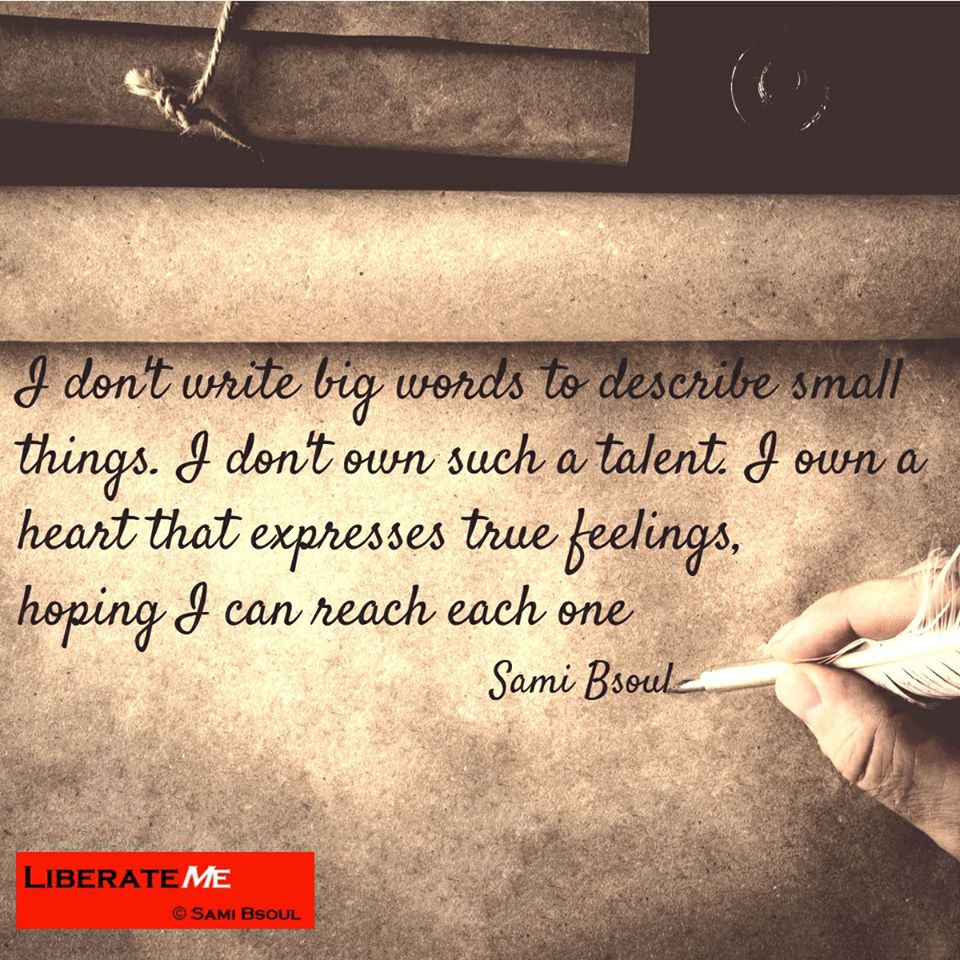
With degree Master Of Science, he remained diligent in his psychology studies, astrology studies and Coaching plus being Hebrew Lecturer for more than nine years. He expanded his studies in particular into the fields of Psychology and Coaching. During this time, he gained a world of experience, learned the languages of the locals and acquired some useful life tips and developed enormous passion and knowledge in Astrology, which he shares with the rest of the world through his writing and the new book Scorpio- The Deepwater and others.